
Barbara Haines-Parmele
Vice President, National Intelligence Solutions Division
ManTech
.png?sfvrsn=b42b25a7_0)
How did you get started in the IC?
I was working at the Federal Reserve Bank of Chicago when I first learned about an opportunity at an agency in the IC. I then earned my Top Secret / Sensitive Compartmented Information (TS/SCI) clearance for this new job, where I worked on an open-source intelligence (OSINT) program.
Can you share a career highlight or milestone or what excites you the most about your job?
My favorite highlights span the “first” things I’ve had the opportunity to pursue. For starters, some 18 years ago I said “yes” to a contract position in support of the IC. That decision launched a career that empowered me to take action every day on a mission I value above all others: helping safeguard the security of this great nation. The key lesson learned, which I will share with you here: If you’re ever asked to do something that you have never done before, don’t hesitate, say “yes!” Doing so will lead to a great learning experience, and can take you down a career path you never anticipated – in great and very exciting ways.
What do you predict will be the top IC issue/focus/trend in the year ahead?
Our nation faces challenges that seem to increase – almost by the minute – at a geometric scale and time frame. While innovative technology solutions will remain a vital approach to mitigating or even stopping such threats in their tracks, there is no question that people will continue to play a very important role. The diverse missions of supporting national security via the Intelligence Sector will require cleared talent, in greater numbers, most notably in the STEM fields. In tandem with growing the talent pool, both industry and government must focus on developing – and growing – pipelines that attract and retain cleared professionals that work in or for the IC.
What one piece of advice would you offer a student considering a career in the IC (or what is one thing you wish you knew before you started your career)?
Don’t decide ahead of time what you can’t or won’t do. When an opportunity comes your way, try it, and if it doesn’t work out, then pivot to an alternate path. Be tenacious, put everything you possibly can into building and shaping your current role, your career and being who you want to be.
What was your favorite movie/book/TV show/podcast this past year?
This year I re-read All the Light We Cannot See by Pulitzer Prize winner, Anthony Doerr. This amazing historical novel set during World War II tells the story of a French girl named Marie-Laure LeBlanc and an 18-year-old private in the German army named Werner Pfennig. The novel focuses on the themes of sight and blindness, as well as light and dark. It also shows how people connect during the darkest of times. I loved Doerr’s use of symbolism, which I feel really enriches the story and the themes he conveys. A key takeaway, as the book description puts it: this story “illuminates the ways, against all odds, that people try to be good to one another.” That’s a very inspiring thought for me personally, and professionally.
Brad Kolarov
Vice President, Mission Systems
Torch.AI
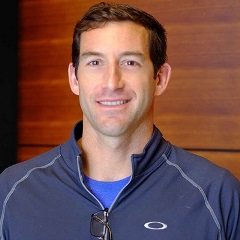
How did you get started in the IC/what inspired you to build a career in national security?
I got my first exposure to the Intelligence Community as a SEAL Officer in the Navy. I worked closely with multiple agencies for mission planning and intelligence collection. I was immediately intrigued by the operational and strategic implications of intelligence collection.
After I resigned my commission, I made it over to Amazon Web Services and was employee #7 in the public sector. I supported both DoD Intel and the IC, culminating with the pursuit and award of C2S (Cloud Computing Services). I am currently a VP of Mission Success at Torch.AI. Since joining the team at Torch.AI, my team and I have been able to support our DoD and IC customers even further by enhancing the capabilities that we had previously developed.
What excites you the most about your job?
I’m excited about the application of real AI/ML solutions to intelligence problems. I think over the next few years it will help change the footprint of the intelligence collection and how intelligence is utilized – a large reason why I am so excited about Torch.AI’s Nexus Platform.
What one piece of advice would you offer a student considering a career in the IC?
I was blessed that I started as a warfighter in the military, so I understood the importance of good and accurate intelligence collection. The advice I would give someone new to the IC would be to get down range and walk in the shoes of an end-user for a while to truly understand who our end users are and how we are supporting them.
What is your favorite movie/book/TV show/podcast?
Favorite Book: Atlas Shrugged – a prescient warning to society many years in advance
Saurin Shah
Vice President
Booz Allen Hamilton
.png?sfvrsn=ca302b13_1)
How did you get started in the IC/what inspired you to build a career in national security?
I got my start in the IC right out of college, in 2001, joining up with a large consulting firm. The timing, so close to the events of 9/11, was compelling to me. With my country literally under attack, I wanted to support the fight, and the best way I could personally have impact was—and still is—to support the national security mission. Over the last 20+ years, I’ve supported many different IC clients, helping to drive solutions and lead teams that are having real impact on our clients’ missions. Perhaps I could ‘have it all’ with a lucrative commercial career, but I would argue that I do have it all because I get to support missions that are critical to the security and stability of this nation. My parents chose to live in this country, and I can’t think of a more appropriate way to honor their sacrifice of leaving their home country than to support the Intelligence Community.
What excites you the most about your job?
In addition to supporting client missions, one of the best parts of my career is growing the next generation of mission support. We have worked hard over the last several years to really expand our data science community in support of the IC. Data science wasn’t necessarily a client need when we started to create our cadre of experts. Leading the clients on the journey toward understanding how this capability could apply to their missions, how to apply the new capability without interrupting current delivery, and ultimately achieving client adoption, that’s what gets me excited about my role supporting the IC.
In the next two-to-three years, what do you think will be the top IC issue/focus/trend?
Technology evolves so quickly, it’s hard to predict what our focus will be in the next two to three years. Our biggest threat hasn’t even been invented yet. I do think it’s safe to say that Artificial Intelligence (AI) and machine learning will play an important role, regardless of what the emerging threat may be. Multi-cloud and hybrid cloud architectures will also play into future concerns, there is a lot of infrastructure that is not currently designed to operate optimally in cloud environments. Pushing and pulling large amounts of data across different providers will result in huge increases in operational costs, could potentially have speeding performance impacts—delaying mission outcomes—could create stability issues, and will eventually lead to a general degradation of capabilities—all of which will severely impact the client mission.
What one piece of advice would you offer a student considering a career in the IC?
A few pieces of advice I like to share with colleagues just starting out in their careers are invest in yourself, build new skills, don’t be afraid to reinvent yourself, and don’t be afraid to question something. Don’t feel like you must sick with the skills you learned in college. Each job you have, every mission you support, keep growing and learning. Capitalize on your fresh perspective and ask why things are done a certain way. You could be the catalyst for change.
In one sentence, what is your leadership philosophy?
As leaders, it is our responsibility to model curiosity, creativity, innovative thinking, and how to take informed/calculated risks.
What is your favorite movie/book/TV show/podcast?
My absolute favorite book is “The Infinite Game” by Simon Sinek. Getting to the Why of what you do, and why you do it the way you do it is a core element that we often overlook. If you don’t have the time to read the entire book, I recommend you check out some of his videos. How and why we connect with others is integral to just being human.
Corey Carter
Program Manager
GDIT
.png?sfvrsn=a54071ce_2)
Corey Carter, a GDIT program manager based in Springfield, Virginia, has spent the last several months visiting classrooms – virtually and in-person – in St. Louis to talk about his work and about his atypical and inspiring career path in STEM.
“Many of the schools I visit don’t even have formal STEM programs,” he said. “These schools are under-resourced, serving underprivileged kids, and many of these kids have never seen an engineer who looks like them. When I go in and talk to the students, we start with what STEM is, how technology plays a role in their everyday lives, and how to get involved in doing STEM work.”
Corey often points to an iPhone as a relatable example of technology and how students interact with the people powering those devices. He talks with them about the people who answer Help Desks, or who code applications for the phone, or who run the network infrastructure that enables everything a person does on a device.
Corey does that with “Lingo Kits,” provided by STEM Board, that give students real-world STEM tasks to complete – like building a prototype back up camera for a Tesla.
“It’s incredible to watch the students go from ‘I can’t do that,’ to ‘Ok, well if I just do this and then this…’ to ‘Oh wow, I did that’ in the span of just a couple of days.
Corey recalled asking one group of students: Who wants to be an engineer? He says, lots of hands went up. Then, when he asked: Who knows someone who is an engineer? No hands went up.
“I had to correct them,” he said. “You know me. I’m an engineer. Now, you know an engineer.”
Corey says that’s precisely the kind of impact he wants to have. He tells the students how he started as a helpdesk technician, then became a system administrator, then systems engineer, then a program manager. He acknowledges that coding isn’t for everyone, and that’s ok. There’s so much more to STEM beyond software development, and if students can get exposed to STEM activities and get involved in the field now in some way, there will be more open doors for them in the future – whether that involves pursuing higher education, taking a certification course, or joining the military as he did.
Gianluca Longoni
Systems Engineer
ManTech
.png?sfvrsn=a1ff089f_2)
"I was born in Torino, Italy, located in the northwest part of the country, in a region called Piedmont. I spent the first part of my life in Italy where I studied at the Polytechnic of Turin, earning a master’s degree in nuclear engineering. I then decided to move to the United States of America in August 2000, where I was accepted in the PhD program at the Pennsylvania State University in State College, PA. Not so long after that, I moved to the University of Florida in Gainesville, FL, where I earned a PhD in Nuclear Engineering Sciences and an MBA."
"Today I am employed as a Senior Cybersecurity Engineer by ManTech International, serving its many excellent customers within the Intelligence Community. In my current role I designed a system to treat complex cryptographic problems that directly contribute to the IC mission around the world."
"Before joining ManTech International, I was a research engineer and manager at the Pacific Northwest National Laboratory (PNNL) in Washington state. At PNNL I developed methods to optimize tritium production for the US nuclear weapons stockpile, and I was a proud member of the Field Intelligence Element working on several projects of national relevance. I remember when I was brought into a project where I had been told, 'We would like to achieve this, but we do not even know if the physics exist, let alone the technology.' This is my best project so far, and it summarizes my attitude, that I have no reservations going into 'unknown territory' knowing that 'I will engineer my way out.'"
"In my spare time I like to work out, and I have been long time practitioner in martial arts, mainly aikido and jujutsu, and when possible I do not pass on the opportunity for some great scuba diving."
Harry Brooks
INSA Policy Intern
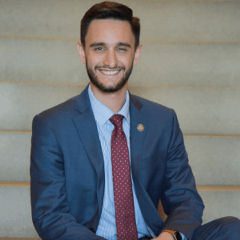
How did you get started in the IC/what inspired you to build a career in national security?
"There were some twists and turns on my way to the IC. I graduated in 2018 with degrees in political science and economics, and after working in state government for a couple years, I decided to go to law school. About a month before I was supposed to start, I realized I wanted to take my studies in a different direction and withdrew my enrollment. I spent much of college doing research on American engagement in the Middle East, so international affairs seemed like a natural alternative. During this transition period, I had some great mentors who pushed me to take this interest even further and pursue a career in intelligence and national security. Now, I’m in my second year of my graduate degree in global security and have found my niche in cybersecurity and emerging technology policy. I’m excited to continue pursuing these interests as I step into a career in the IC."
What excites you the most about your job?
"I’ve really enjoyed working with INSA’s Cyber and Technology and Innovation Policy Councils. Cybersecurity and emerging tech are newfound areas of interest for me, and I have been able listen in on and, in some cases, participate in fascinating discussions and thought leadership around these issues. The councils have also exposed me to both government and industry perspectives on these topics, which gives me a well-rounded understanding of them that I will be able to bring into my career in the IC."
In the next two-to-three years, what do you think will be the top IC issue/focus/trend?
"In the coming year, I believe the IC will increasingly need to reckon with adversarial uses of new technologies, such as AI and machine learning. China in particular has been keen to develop its own AI/ML-enabled intelligence and military capabilities and may soon outpace the U.S. in this space. As the amount and velocity of data increases, the IC will also need to figure out how it can exploit emerging technologies to improve the collection and analysis of intelligence."
What one piece of advice would you offer a student considering a career in the IC?
"My biggest piece of advice is to take risks, be bold, and never stop learning. The intelligence community is just that – a community. From my experience, the IC functions so well because its people are willing to share their experience with the next generation, and you should never be afraid to ask about opportunities, advice, or feedback. The worst somebody could say is no (and they probably won’t!)."
Favorite Book: "My favorite book from the past year was Project Hail Mary by Andy Weir. The author uses real science to create a science fiction world that is pure escapism for a space nerd like me."
Brittany Van Soest
Spotlight Production Manager
Maxar
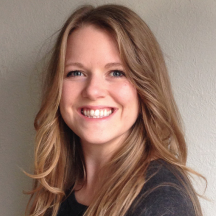
How did you get started in the IC/what inspired you to build a career in national security?
"With effort and dedication, anyone can make a career change and transition their skills in support of the Intelligence Community (IC). My journey began in January 2015, when the French satirical newspaper Charlie Hebdo was attacked in retaliation for printing cartoons of the prophet Muhammed. This launched my fascination with radicalization, national security and intelligence collection and analysis, and ultimately inspired me to change careers. With a background in sales and no connections in the IC, I needed some way to enter this new field. I found an opportunity to write for a small risk analysis firm and, in the evenings after my day job, I trained with a contractor where I analyzed critical incident trends in Algeria for an oil and gas client. Finding my niche in OSINT analysis, I pursued my education at the Josef Korbel School of International Studies in Denver, CO. Two years and three internships later I earned my Master’s in International Security, fully prepared to launch my second career in support of the IC in the private sector. I now have the privilege of showcasing Maxar Earth Intelligence capabilities to a wide audience through the bi-monthly Maxar Spotlight publication, available here:" https://explore.maxar.com/spotlight.html
What excites you the most about your job?
"My career highlight was my time providing guidance to the first-of-its-kind, Algerian-run analyst group operating in the U.S. Embassy in Algiers as part of an internship with the Department of State. My role included clarifying requirements from key consumers at the embassy, identifying gaps in content and consistency, and advising the Regional Security Officer of areas for improvement. I am proud of my contribution to the collection, analysis and delivery of OSINT reports used to assess the risk to embassy personnel in Algeria."
In the next two-to-three years, what do you think will be the top IC issue/focus/trend?
"The United States and its allies will increasingly benefit from quick-turn, actionable GEOINT data and analysis. As machine learning is further integrated into collection methods and processing, the U.S. will need to outpace the competition by partnering with industry-leading Earth Intelligence experts."
What one piece of advice would you offer a student considering a career in the IC?
"Being a recent student, my advice is threefold:
- Be A Learner: Remain teachable, ask for training and support, and always expand your skillset.
- Be Bold: Interview your superiors and glean insight from their career journeys; this was the #1 thing that opened the door to my career in the IC.
- ‘Know Thyself’: Take advantage of the plethora of tools available to identify your strengths, then pursue them ruthlessly. My favorites are StrengthsFinder, Stand Out, Emergenetics and Myers-Briggs Type Indicator."
Favorite movie/book/TV show/podcast: The book ‘Winning the War on War’ by Joshua S. Goldstein offers a glimmer of hope for those focused on the day-to-day support of intelligence collection and analysis. We in the IC can take heart that providing the most pertinent and timely intelligence to support our military and international partners is contributing to the broader goal of bringing current conflicts to a close and preventing new conflicts from developing.
Stephanie Jaros
Director of Research
DoD Counter-Insider Threat Program
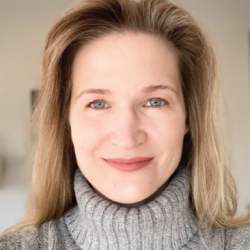
How did you get started in the IC/what inspired you to build a career in national security?
"Long story very short, [my start in the Intelligence Community (IC)] was a bit of an accident. I attended a government career fair during graduate school. At the time, I was interested in health and policy jobs because my graduate research was about how couples made reproductive choices. Ahead of the fair, a representative from US Customs & Border Protection called me after she saw my résumé in the résumé bank and invited me to interview. I never turned down an interview, so I talked with CBP at the career fair and ended up accepting a position with a small research unit within the Office of Professional Responsibility focused on studying and preventing corruption in the workforce."
What excites you the most about your job?
"I’ve told this story so many times before but it really was and is the most significant moment in my career since I joined the Department of Defense in 2015. The first time I met Dr. Brad Millick, the Director of DoD’s Counter-Insider Threat Program, we had a great conversation about his vision for DoD’s enterprise-level program and how he wanted to incorporate the social and behavioral sciences into that vision. He literally pointed at me and said, “And you’re going to build that program!” I remember looking behind me and then looking at him saying something like, “Me? Do you mean ME or someone LIKE me?” and he said, “You.” We didn’t know what this program would look like, where the money would come from, or where we’d start, but these are the conditions under which I work best."
In the next two-to-three years, what do you think will be the top IC issue/focus/trend?
"Back when I was with CBP, I remember talking with a representative from the Army’s 902nd Military Intelligence Group about how to prevent ideologically-motivated insiders from harming our organizations. The type of concerning ideologies may have since shifted, but we are still having the same conversation in 2021. What does a Counter-Insider Threat Program look like that successfully identifies and mitigates potential threats to the safety of our workforce but also protects the privacy and civil liberties of our personnel?"
What one piece of advice would you offer a student considering a career in the IC?
"[My advice for someone considering a career in the IC is] Nothing in school prepared me to write like I need to write as a government researcher who works in security. Shorter is better; keep summaries to 2 pages; 1 page is better if a document is going up the chain of command. Everything – text, tables, and figures – needs to stand on its own because I won’t be in the room to explain."
Favorite movie/book/TV show/podcast: I really do love books, movies, and podcasts about people who start out as lauded visionaries and end up on trial, out of office, or thrown out of the companies they founded. Books include: Bad Blood (Theranos); The Smartest Guys in the Room (Enron); Empire of Pain (Purdue Pharma); Too Big To Fail (Wall Street); and The Cult of We (WeWork). Podcasts include: Cautionary Tales, Gangster Capitalism, and Slow Burn.
Mel Kepler
Practice Lead, Talent Development and Engagement
LMI
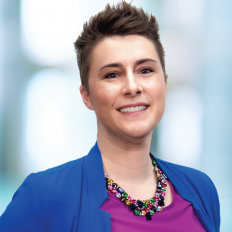
How did you get started in the IC/what inspired you to build a career in national security?
"I graduated with a degree in linguistics during the post 9/11 hiring boom, so the Intelligence Community (IC) was a natural fit. I started with the National Geospatial-Intelligence Agency (NGA) as an intelligence analyst in 2005. I then did two years of shift work in the White House Situation Room as a duty officer, followed by stints as an executive officer at NGA and a tradecraft specialist in IC structured analytics techniques before I jumped into human resources and government consulting. I've always taken this approach of not necessarily knowing what my next job will be. I enjoy being able to go where I am needed and where my skills can make a difference."
What excites you the most about your job?
"One of my proudest accomplishments while serving in the IC was establishing a parents network organization at NGA, which was one of the first at a federal agency. We all bring our personal lives and concerns to the workplace, especially parents, but when we’re at work, we want to be at work. My thought was anything that makes information and resources available to me as a parent, the easier time I’ll have focusing on my job. Two colleagues and I founded this grassroots organization that grew to several hundred members. Among our initiatives, we held a Bring Your Child to Work Day, successfully lobbied for hospital-grade nursing pumps at main employee work sites, and compiled the policies and guidelines related to family expansion so aspiring parents would have all the necessary information. Parenting-focused advocacy or employee-resource groups are new and I'm very proud to be at the forefront of their adoption in the federal sector."
In the next two-to-three years, what do you think will be the top IC issue/focus/trend?
"I think the IC must reckon with the challenges of adjudicating clearance holders in today’s environment, and the future environment. Marijuana is legal in many parts of the country now. When do we begin to assess marijuana usage the way we assess how many alcoholic drinks a person has per month? We need to start thinking about it that way, and the longer we wait the harder the change will be—not just about marijuana, but about associations on social networks or dating apps, and bringing personal digital devices to secure work sites. If we don’t tackle these questions honestly, it will hurt our ability to build an inclusive Intelligence Community that fully represents the American people."
Favorite movie/book/TV show/podcast: I really liked “The Good Place.” I thought it was A) super funny and B) an interesting look into the complexity of factors behind the decisions that we make. As a former intelligence analyst, I was fascinated watching characters examine their own motivations.
Josh Sisskind
Senior Manager, Foundation GEOINT
Maxar
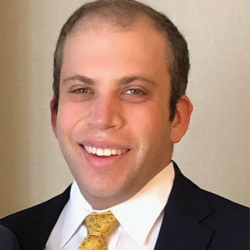
How did you get started in the IC/what inspired you to build a career in national security?
"I stumbled into the IC by accident. While working on my graduate degree, I won a student award funded by ITT Space Systems Division (now L3Harris). A few months later, I received a call that ITT was interested in interviewing me for a position in Northern Virginia for its emerging Geospatial Systems group. My first task in that role was helping image scientists understand how geospatial data and tools could be incorporated into their workflow, especially with object detection and LiDAR."
What excites you the most about your job?
"One of my first opportunities to see how my work could directly impact mission was in 2010 following the devastating earthquake in Haiti. My team was part of a group that had the first LiDAR collection over the island and we were able to generate multiple products, including helicopter landing zone and “blue tent detection” datasets to provide NGOs in the field. The biggest lesson I learned from that experience is that mission support requires a dynamic and diverse team to provide the best result. I’ve had the good fortune to continue to work with talented people throughout my career, especially at Maxar. I get to be a part of an end-to-end solution where some of my colleagues are building satellites, others are processing and analyzing imagery, and I carry out production workflows and derive geospatial features from the imagery. In this role, I get the opportunity to directly engage with end users to learn how Maxar data and technology provide them the critical information required to achieve their mission."
In the next two-to-three years, what do you think will be the top IC issue/focus/trend?
"[Automation] is a term I often hear when it comes to “what’s next," but I believe we as a community still need to define what that actually means and continue to clarify that automation does not mean replacing the human workforce with artificial intelligence. Instead, we should continue to explore how automation can be used to reduce the time it takes for an end user to generate actionable intelligence from vast datasets, especially as the amount of data gathered increases exponentially. "
What one piece of advice would you offer a student considering a career in the IC?
"My advice to anyone starting in the IC is to be a sponge. There are so many different opportunities within this community that it can be overwhelming at first, but take every opportunity to hear different perspectives on mission support to build your own view on the role you will play."
Favorite movie/book/TV show/podcast: I like Shark Tank and How I Built This because you get the opportunity to learn how other people have built their companies and products. They can offer lessons in what to do (or what not to do).
Melissa Sutherland
Senior Vice President
Booz Allen Hamilton
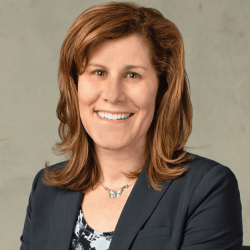
How did you get started in the IC/what inspired you to build a career in national security?
"My entry into the intelligence community was as a Marine Corps Signals Intelligence Officer, where I led ground electronic warfare teams and developed “at the edge” intelligence architectures, to include supporting combat operations in Iraq. I continued my intelligence career working as a government employee leading a Joint Experimentation and Engineering lab in support of the Joint Combatant Command Joint Intelligence Operations Center implementation."
What excites you the most about your job?
"One time I flew to this remote area in California to pitch to a client that was skeptical of a technical approach we were implementing. I thought I would be speaking with one guy, their lead engineer, so I had an engineering book with my architecture diagrams ready to pitch to him alone. Not to mention my senior partner had accompanied me on the trip to engage in other client dialogue and due to schedules joined the meeting. When I arrived, I saw a room with about 30 people in it. My immediate thought was ‘I am in the wrong place,’ but no, this was the room. I had 30 people hovering over this book and asking questions about it and no briefing deck. The pitch went great and resulted in both client adoption and funding along with positive engagement with the senior partner, who, incidentally, later helped sponsor me for promotion."
In the next two-to-three years, what do you think will be the top IC issue/focus/trend?
"The top issue will continue to be how we infuse technology across the multi-domain infrastructure to fuse multi-intelligence (INTs) and classified/unclassified data to ensure we maintain the mission/decision advantage."
What one piece of advice would you offer a student considering a career in the IC?
"I believe the key to being successful is to network, network, network. Make sure you have sponsors and mentors to help you navigate the agency or company culture. Get a “top ten”—a group of ten people who can help with different aspects of your career. Many of my top ten are the same from when I started my career, and that just shows how important it is to build your peer network early on.
Also, I think there’s a lot of value in the term “Carpe Diem,” ... seize the day. Enjoy the moment. Don’t be so focused on what’s next. Just appreciate the time for what it is. Don’t let the present experience pass you up being too anxious to get back to other things."
Favorite Outside Interest: I love hanging out with my family at our cabin or doing something fun with my six-year old son. I love hiking, biking, skate boarding, playing with Legos, Batman toys and playing video games, I’ve been skateboarding ever since I was a kid, and now that my son likes it, I get to live vicariously through him.
Ingrid Peterson
Director, National Security Segment,
Guidehouse
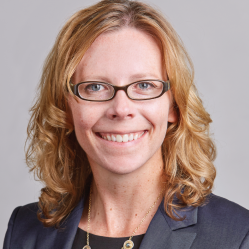
How did you get started in the IC/what inspired you to build a career in national security?
"I started my career in the Navy as a Naval Flight Officer flying EP-3s (a reconnaissance aircraft) out of Rota, Spain. When I joined the squadron, I wasn’t thinking about my connection to the IC, but the insights we gained and overall contribution to the national security mission became much clearer over time. I concluded my time in the Navy with a shore tour at the Office of Naval Intelligence as an Air/Air Defense analyst. When I transitioned out of the Navy, I jumped into consulting and began supporting the IC as a first client. Currently, I’m at Guidehouse and continuing to engage with the IC – it’s been an incredible journey."
What excites you the most about your job?
"It’s so exciting for me to work with such a talented group of professionals at Guidehouse. I continue to be impressed with the creativity, drive, and technical ability our team brings to the clients. Some of my best experiences have happened during brainstorming and solutioning sessions where I get to see team collaboration at its finest. We have a tremendous team culture that has been built over time, and I’m so thankful to be a part of it!"
In the next two-to-three years, what do you think will be the top IC issue/focus/trend?
"I think the overall security posture (and data security specifically) will be a focus going forward. On a personal level, we’ve all been impacted recently by the surge in cyberattacks. In the IC, sensitive information from manned and unmanned systems across the globe will continue to be a challenge to secure. I’m confident we can stay ahead of our adversaries, but it will require collaboration across the IC in new and innovative ways."
What one piece of advice would you offer a student considering a career in the IC?
"If you have the opportunity, take it. You can always change your mind or make a pivot later. Like many others, when the pandemic hit I bought a Peloton. I equate a new career challenge or decision to some of the workouts (specifically the high intensity interval training). Prior to the interval, the instructor asks, “Are you ready…Yes or Yes.” That always gets me motivated."
Favorite TV Show: The Queen’s Gambit. I was hooked immediately and had to stay disciplined on the number of episodes I allowed myself to watch per night! The plot was fascinating and it got me excited about learning chess. Her obsession with the game and ability to visualize a strategy ahead of the match was amazing.
Patty Mims
Director, Global National Government,
Esri
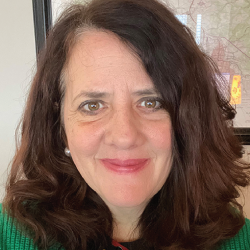
How did you get started in the IC/what inspired you to build a career in national security?
"I got started in the IC in the late 90’s helping to move hydrographic and aeronautical charts to a modernized digital process. It was exciting to then see how you could take what was static data and how it could become dynamic with routing, alerts, etc and incorporate satellite imagery to see changes quickly. This then evolved to using this data in analysis to solve more complex problems."
What excites you the most about your job?
"What excites me about my job is supporting the mission across the IC and the Federal government. It’s amazing to see how geospatial technologies are expanding to enable and support some many of our nation’s challenges."
In the next two-to-three years, what do you think will be the top IC issue/focus/trend?
"I still believe the magnitudes of data will be a challenge. We need to be able to quickly assemble and integrate the most timely and relevant data to make decisions. Being able to analyze and visualize the data for understanding is key and as we have more and more data this becomes a greater challenge."
What one piece of advice would you offer a student considering a career in the IC?
"I believe you need to be a life long learner. The world is every changing and evolving and we need to continuously learn, adapt, and change the way we do things to improve. I would suggest that you should always volunteer to learn something new and try something different. Never believe that they way we used to do something is the way we have to do it in the future. I love working for Esri, a technology company, because we are always creating new capabilities and evolving the way we work."
Favorite movie/book/TV show/podcast: Wow… this is the hardest question because I like lots of different things. But I think the most consistent thing I watch or listen to is the news. I like to know what’s happening around the world… not just the current events, but cultural activities and how our world is evolving and changing.
Dedra Bonner
Program Manager, Unified Platform System Coordinator,
Northrop Grumman Mission Systems
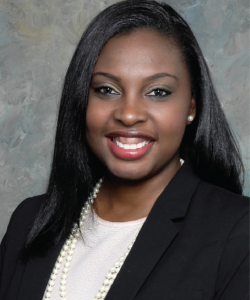
How did you get started in the IC/what inspired you to build a career in national security?
"I began my career in the IC about 8 years ago as a systems engineer, supporting a Northrop Grumman program where the key functions centered on creating enterprise service solutions to provide actionable intelligence data to the DoD/IC."
What excites you the most about your job?
"What excites me is information! I get to be a part of creating and observing the demonstration of innovative ways to access and share information and its impacts on our national security. In this information age and in a cyber-world, ensuring everyone that needs information can get it securely and completely is key. Further, providing relevant data to inform decisions that affect our way of life is also exciting to me."
In the next two-to-three years, what do you think will be the top IC issue/focus/trend?
"The top IC issue/focus/trend will be the continuous evolution of cybersecurity solutions, in addition to managing the secure access of information and using more effective ways to protect key data and prevent harm to individuals and nations."
What one piece of advice would you offer a student considering a career in the IC?
"Do not try to “home grow” a solution to every problem; create a network of people who can help you develop solutions. Building relationships with people who can help you be more effective in developing a solution can create truly mutually beneficial partnerships and this is a skill you should build early in your career. I recommend thinking beyond what you know and are comfortable with by creating more connections. Then widen your scope of who can provide good ideas—this will help you think smarter and with more depth."
Favorite TV Show: My favorite show is The Office—it is hilarious and smart. The show helps me de-stress and remember to enjoy life with laughter.
Kathleen Pumphrey
Program Director of National Intelligence,
SAIC
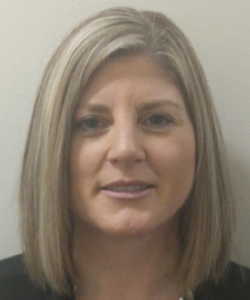
How did you get started in the IC/what inspired you to build a career in national security?
"My first job in the IC was at the CIA as a government employee. I started out of college and worked there for 15 years before becoming a contractor."
What excites you the most about your job?
"Many aspects of my job as a Business Area Manager/Program Director excite me. I enjoy the variety of responsibilities and challenges that my job presents. Each day is different, and being able to anticipate and manage issues while also coaching team members to achieve more and get them motivated and excited about work is appealing. I am very competitive and this job fulfills this purpose in many ways."
In the next two-to-three years, what do you think will be the top IC issue/focus/trend?
"In the next 2-3 years, I believe that China, Russia and Cybersecurity are all still going to be the top IC issues. I don’t think any of them can be considered the top. They all have to be worked as they all are very important. As rapid advances in technology continue, malicious and Cyber-attacks are still going to be an issue that needs to be a top priority. And, China/Russia are not going away as major threats to the US.”
What one piece of advice would you offer a student considering a career in the IC?
“If you want a career where you will achieve genuine satisfaction, knowing that you will make a real contribution to our country and help protect those you love, then join the IC. And, understand you will be challenged to make decisions and be privy to information that most will never have to make or be aware of. For that, you may need to make compromises.”
Favorite TV Show: Yellowstone. Yellowstone is prime real estate and it is exciting watching the powerful Dutton family fight to keep their land away from developers, major corporations, and politicians while also watching the day-to-day drama, action play out on the ranch.
Jennavie Angelone
Supervisory Analyst, Investigative Research Lead
Exiger Federal Solutions
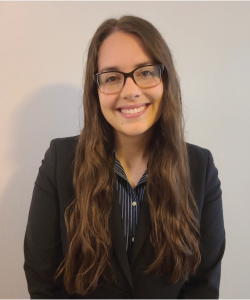
How did you get started in the IC/what inspired you to build a career in national security?
“My first experience in the IC was when I started as a Background Investigator. I loved traveling the country and interviewing a variety of different people. Additionally, the fact that it was to ensure the safety of our country made it an even more rewarding experience.”
What excites you the most about your job?
“Exiger is a global leader in tech-enabled risk management and compliance solutions for government, corporates and banks – across our company, we share a mission to make the world a safer place to do business. What drives me to succeed in my role is the constant opportunity to solve tough problems our clients face. I really love researching, so I am lucky that I am able to use so many different intelligence sources, including the dark web. I love being able to identify threats, patterns, intelligence gaps, and bottlenecks that our team ultimately briefs to our clients. Knowing that my findings are used in decision-making by our country’s leadership is super exciting!”
In the next two-to-three years, what do you think will be the top IC issue/focus/trend?
“I believe there will be an increased focus on improving protections of U.S. infrastructure, especially regarding private sector data. The recent SolarWinds and Colonial Pipeline hacks were a wakeup call, reminding us how our adversaries are becoming more sophisticated and can bypass strongly safeguarded targets.”
What one piece of advice would you offer a student considering a career in the IC?
“In collaborating with experts across multiple areas of Exiger, a consistent theme that jumps out to me is that it is our employees’ skill sets that allow us to be so successful. We have folks with expertise ranging from data analysis, to computer science, to language translation—there’s a need for all types of specialties here. I would advise students not to worry much about their particular major, and think more broadly about the skill sets they can cultivate along the way that can be used to achieve counterintelligence goals.”
Katea Murray
Cyber Engineer/Cyber Tech Fellow
Leidos Intelligence Group
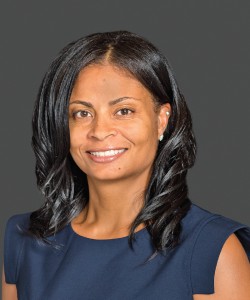
How did you get started in the IC/what inspired you to build a career in national security?
"It was sort of happenstance after starting as in intern working as a software developer for Leidos one summer. After interning a second year, I was asked to support an Intelligence Group project that allowed me to not only explore a diverse range of technologies, it encouraged all engineers to innovate and think outside the lines to create solutions. It was my first exposure to the IC, and I have not looked back."
What excites you the most about your job?
"What excites me most about my job is the ability—and encouragement—to innovate and challenge myself to develop new, vital, breakthrough solutions that support IC customer missions. As a Cyber Engineer and Cyber Technical Fellow in the Intelligence Group at Leidos, I’m aligned to a diverse range of projects and programs that keep IC and national security leaders up at night. In the world of cyber, no day is the same. Innovation drives constant changes in technology that we see each day and vice versa. Most importantly, it drives changes to more than technology including how we look at our processes and productivity and how we become more agile and efficient. As a cyber engineer, that continuous tech innovation and the awareness that threat actors are always evolving their methods, compels me to think about how to work smarter, faster, stronger."
In the next two-to-three years, what do you think will be the top IC issue/focus/trend?
"Disruptive cyber threats will become a priority issue in the next two-to-three years. I think we’re already seeing that start now with the recent supply chain and infrastructure systems cyberattacks we’re seeing all too frequently. These types of sophisticated threats are about more than ransomware, they upend business and commerce and force organizations large and small across every industry to evaluate and often completely change their infrastructure. "
What one piece of advice would you offer a student considering a career in the IC?
"Always seek and be open to new opportunities. The IC is a diverse, ever expanding, rapidly evolving community in need of smart people with new ideas who are also willing to help. Don’t be afraid to create your own opportunity; if you see a different pathway, create it, take it, and remember opportunities are what you make of them."
Favorite Movie: One of my favorite movies is Remember the Titans—I cannot resist Disney movies. I love watching how players with different backgrounds and experiences came together after such resistance to create something so special and so powerful; the spirit, strength, and camaraderie really resonate with me.
James Chappelear
Program Manager
Jacobs
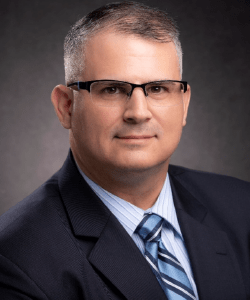
How did you get started in the IC/what inspired you to build a career in national security?
"Ever since I was a child, I’ve always had a drive to serve our country...I was commissioned in the Air Force in 1994 and served active duty for almost 26 years as an Intelligence Officer, so I got my start in the IC there. I retired last June as an Air Force Colonel, and I feel fortunate to have been hired as program manager for The Buffalo Group’s Intelligence Support Contract for United States Space Command Directorate of Intelligence (J2) and have been with the company almost one year. I’ve served in a myriad of positions during my time in uniform, most recently to include Chief of Staff, Intelligence Directorate at NORAD and USNORTHCOM. Prior to that, I served as Mission Support Deputy Director for NORTHCOM J2 and spent a year deployed in Kuwait as Operation Inherent Resolve J2 Chief of Targeting. As a career intelligence officer with a background in Special Operations, Intelligence Surveillance and Reconnaissance (ISR), and Targeting, I have commanded at the Squadron level and am a fully qualified Joint Staff Officer. My staff tours have included Joint Functional Component Command for Global Strike Directorate of Intelligence, U.S. Strategic Command, Director of ISR, Joint Special Operations Task Force Afghanistan, and Director of Intelligence, Special Operations Command, North, U.S. Special Operations Command. As an intelligence officer, I’ve deployed multiple times over my career in support of joint air and special operations."
What excites you the most about your job?
"Building out a team to support the standup of SPACECOM J2 has been a career highlight for me thus far. In this role I’ve had the opportunity to lead a diverse team ensuring critical support to the SPACECOM intelligence mission. In this capacity, I’ve been able hire impressive intelligence professionals working everyday to prepare our nation to conduct operations in, from and to space to deter conflict, and, if necessary, defeat aggression, deliver space combat power for the Joint/Combined Force and defend U.S. vital interests with allies and partners."
In the next two-to-three years, what do you think will be the top IC issue/focus/trend?
"I believe that defending our national interests in space and cyberspace will remain a key focus area for the future. Although I know that I’m biased, I believe that defending our freedom of maneuver in space is critical because space impacts almost all facets of our lives today and as the SPACECOM Commander’s strategy states “a day without space” would have significant impacts to our daily life."
What one piece of advice would you offer a student considering a career in the IC?
"My advice would be to make good choices. A career in the IC can be tremendously rewarding, but we need a diverse, inclusive workforce with impeccable character to help defend our nation and our way of life. To qualify to be in the IC, we need a workforce built on integrity and character, so It’s important to make good choices that will enable entry into such an important career."
Favorite TV show: For All Mankind on Apple TV. It’s been fascinating watching a fictional series about what would have happened if America hadn’t been the first humans on the moon, and if we had entered an arms race on the moon with the former Soviet Union.
Megan Moloney, JD, CISSP
National Security Segment Managing Consultant
Guidehouse
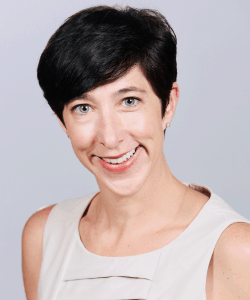
How did you get started in the IC/what inspired you to build a career in national security?
"People who join the IC seem to come in one of three ways: They have exposure through family or close friends, they transition in through the military, or they fall into it. I was one of the latter. I started my career as a litigator in New York and subsequently became an Investigator with the United Nations Office of Internal Oversight Services. I was perfectly happy with that career trajectory, but—as someone with a bent for public service—I jumped at the opportunity to join the Federal Bureau of Investigation (FBI) as an Intel Analyst. Little did I know what a world of opportunity it would open up!"
What excites you the most about your job?
"The people and the problems. I am constantly humbled and honored to work with extremely smart people who have a shared sense of commitment to service and country. And with the range of problems we are tasked to solve, there is no room for boredom! I've been able to wear a multitude of hats in furtherance of a dizzying array of problem sets. In a word, it's dynamic."
In the next two-to-three years, what do you think will be the top IC issue/focus/trend?
"From my vantage point, the issue de jour is supply chain. It is not unique to the IC; it affects critical infrastructure partners, the defense industrial base, and the broader government—to include state, local, tribal, and territorial entities. We all have to work together to meet complex and intensifying supply chain integrity challenges."
What one piece of advice would you offer a student considering a career in the IC?
"Say yes. Even if you are unsure exactly what you are saying yes to."
Favorite TV show: A Call to Spy, based in part upon the life of Virginia Hall and her biography written by Sonia Purnell, A Woman of No Importance: The Untold Story of the American Spy Who Helped Win World War II. It is a compelling example of the long-standing and incredible contributions that women have made to the IC. Those stories need to be told. The movie was great, but I also must say viewing it was a peak experience because I also participated in INSA's Wednesday Wisdom session with Sarah Megan Thomas, the writer, producer, and starring actress. She even answered a question from my eight-year-old daughter!
Gabe Alix
Vice President of Intelligence
Applied Insight
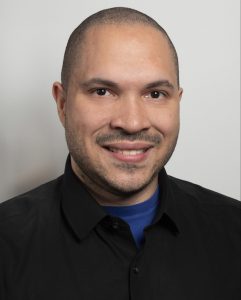
How did you get started in the IC/what inspired you to build a career in national security?
"I got my start in the IC during college. As part of my Horatio Alger scholarship program, I was invited to D.C. to mingle with people from different companies and learn more about what they do. While we were there, we took a tour of an Intelligence Community member, where I met a recruiter. We hit it off spectacularly, and she advised me to apply for the Stokes scholarship, letting me know that it was highly competitive but could lead to me being hired by that agency. I won the scholarship and became a government employee while I was still in school, and after graduation, I went to work for them full-time. It was a life-changing experience!"
What excites you the most about your job?
"Building a product from the ground up like SHIFT and helping it succeed was the defining highlight. I helped design the first prototype of SHIFT, build its branding, strategy and sales, and helped customers tackle complex problems.
When you take commercial software and try to bring it to classified regions of the cloud, it actually doesn’t work unless you make significant changes. We started with developing a proof of concept for a software company, so their app could work in a disconnected region of the cloud. It was a success, and it opened up a world of opportunity for them to bring in a whole new set of customers.
That’s when we realized that we had a product that would help hundreds of National Security customers access the best commercial software. We knew it would also allow companies to hire uncleared and remote talent to develop new applications destined for classified use. It was exciting to transform a small professional services company into a software products company with all the mechanics and the insane hours that went into it. Applied Insight bought the company because they saw the value for their own customers and how it could be used with their Altitude product, so that’s how I became part of the Applied Insight team."
In the next two-to-three years, what do you think will be the top IC issue/focus/trend?
"Remote work is a defining issue for the IC. How we all respond to this challenge will change the IC’s trajectory for the next 10-20 years. We’ve been trying to solve the same problems for years: we don’t have enough cleared people; everyone’s too expensive; and we’re not getting everything we need done in time. Improving the complicated clearance process seems to be so challenging that it can’t be the only solution. Embracing low to high side development and managing the risks of remote work will define whether the IC becomes more or less successful over time. Zero Trust is part of that equation – it’s a way to mitigate the risks and build the next generation of better, more secure capabilities."
What one piece of advice would you offer a student considering a career in the IC?
"My advice to a young person would be to join the IC early on, build your network and hone those foundational skills. They will serve your career for decades, wherever you decide to go. You will be part of a great mission, helping stop threats to our national security and preserving the freedom of our nation."
Favorite TV show: I’m reading a great book right now: Good Economics for Hard Times. Such an exciting book linking our times to economics in a very accessible way. When it comes to movies, my favorite of all time is Gattaca. It’s set way in the future where humans have found a way to manipulate DNA to make the perfect children. It raises questions about what makes us human. It’s a harrowing tale of fighting for your dream, no matter the odds. As noted in the film: “There is no gene for the human spirit.” It just came out on 4K, and it’s on my “to watch list” upstairs.
Joseph Boutte
Business Collaboration Executive
Dun & Bradstreet
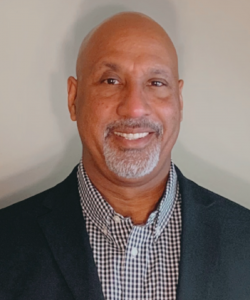
How did you get started in the IC/what inspired you to build a career in national security?
"My beginnings in the IC were with the Army Airborne Reconnaissance and Electronic Warfare operations in the early 80s. I served in Guardrail units in Europe and Central America. Other assignments included the 101st Airborne Division, Echelons Above Corps units, and INSCOM where I led Voice Intercept and Mission Operations. These tactical assignments equipped me for operational and strategic assignments in national security billets after my military career."
What excites you the most about your job?
"One of my favorite experiences was serving at the ODNI as part of the Collection Integration Group. The government, military, and contractor teams integrated various collection activities and emerging technologies to support National Intelligence Managers, policymakers, and deployed forces. A silhouette of a soldier on the wall reminded us each day of the importance of our work and that someone in a far away place needed our intelligence to perform their mission."
In the next two-to-three years, what do you think will be the top IC issue/focus/trend?
"Yogi Berra said, 'the future ain't what it used to be.' I agree. Predictions are dangerous in a hyper-disruptive world. The issue that may lead the IC's focus over the next few months is multi-dimensional threats from known adversaries, extremism, and growing polarization fueled by a toxic mix of disinformation, politics, nationalism, and great power competition."
What one piece of advice would you offer a student considering a career in the IC?
"[Advice for a student considering a career in the IC] Read and think about history, technology, science fiction, and leadership to fuel your imagination. Voracious reading of a variety of topics helps to widen our perspectives and critical thinking. Creativity and critical thinking enable multiple and broader world views. This creates the space to unpack, digest, and synthesize data for insight, action, opposing views, and new ideas to inform analysis and better intelligence products."
Favorite TV show: News from the World, starring Tom Hanks and Helena Zengel. The story highlights the common issues between a post-Civil War environment and current events. Through time and space, our similarities help us better understand trends, patterns, and behaviors. The unpredictable journey of a war veteran and an orphaned girl evokes dystopian reminders of the costs of war, racial conflict, and a variety of serendipitous interactions with devastating results. The title is not the movie's focus, but it is the golden thread that ties the theme of connection and the need for information that makes the film relevant. In a word, the movie is about the resilience of our species through major disruptions like wars and pandemics to achieve the allusive normal.
Jenny Smith
Director
Raytheon Intelligence & Space
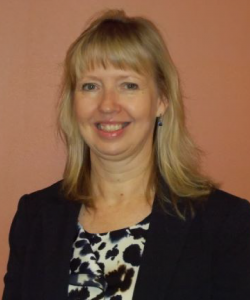
How did you get started in the IC/what inspired you to build a career in national security?
"As an electrical engineering student, I was selected for the co-operative education program at the National Security Agency (NSA). This was a tremendous opportunity for me. I was assigned to several different organizations that helped lay the foundation for my future career including a tour that supported QRC missions and another that helped me develop my programming skills. My last supervisor ended up leaving NSA and going to a small business where he recruited me when I graduated from college. That small business was bought and sold a few times and became Raytheon Technologies, where I still remain today."
What excites you the most about your job?
"I am most excited about supporting our important customer missions and supporting our employees who do so many great things. My top career highlights have combined both those elements. Working with a team to develop ideas to support a critical customer mission and writing a winning proposal is a career highlight. Not only do you get the excitement of supporting a new customer and mission, but you create new opportunities for your employees—a win/win!"
In the next two-to-three years, what do you think will be the top IC issue/focus/trend?
"The IC will need to focus on changes that come with the new administration, the development of an active coordinated defense across the IC and a commercial industry to combat cyber security threats, and addressing staffing impacts resulting from COVID as employees seek to work from home and move to commercial companies."
What one piece of advice would you offer a student considering a career in the IC?
"[Advice for a student considering a career in the IC] Be proactive about gaining exposure to customer missions and technologies—many of these are uniquely available in the IC. Look for opportunities, ask questions, and try new things. My career progressed by reaching out to provide a helping hand to the busiest people in my business area. I learned new skills, developed relationships with great mentors, and was afforded new opportunities. Be positive. Attitude is a little thing that makes a big difference."
Favorite TV show: The Queen's Gambit was outstanding. I enjoyed the character development and focus on how she perfected her skill. A bonus was the increased popularity in a quarantine-friendly activity!
Shaina Turner
Capture Manager, National Programs
World Wide Technology
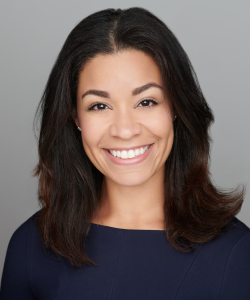
How did you get started in the IC/what inspired you to build a career in national security?
"My start in the IC was as a Junior Proposal Writer (Technical Writer) at Six3 Systems, initially writing past performance references for proposal responses to the government. The choice was not based on the customers that the company supported, as I had no familiarity with the IC before taking the position. However, not much time progressed before I came to appreciate the customers, missions, and the industrial base that support them. I enjoy the environment created by the nature of our work and the dedication and skill that work demands of those who support. It is an environment and culture that places emphasis on what individuals have to offer to achieve our goals, and not as much on rank, title, or demographic. Our missions are complex, dynamic, challenging, and critically important to our nation, and I enjoy being challenged and constantly learning. Even though I did not deliberately choose to support the IC initially, I've made a conscious decision to stay, and I take pride in doing so."
What excites you the most about your job?
"Although I do not currently directly support our customers from the line, participating in the acquisition processes supporting critical national security requirements keeps me motivated. The intentional journey of learning a customer's unique mission needs; forming a high-performance team comprised of internal and external "A-players" in requisite areas of expertise; and devoting countless hours discussing, debating, whiteboarding, etc. to develop the most effective combination of technology, expertise, and management methodologies—that journey excites me the most about my job. Each one has its own nuances and problems to be solved, and each offers an opportunity to learn and collaborate differently than before."
In the next two-to-three years, what do you think will be the top IC issue/focus/trend?
"Technological parity and continuous progress, mostly around data [will be the top IC focus in the year ahead]...Our customers are very aware of the risks associated with not taking a technology-first approach to their missions and are no longer accepting the traditional SME-centered approaches to support their needs. They are more informed than ever of the advancements in areas like microservices, AI/ML, and edge computing, and expect to maintain parity and speed of progress with the most advanced organizations, commercial and government."
What one piece of advice would you offer a student considering a career in the IC?
"[Advice for a student considering a career in the IC] Relationships are important. Embrace networking, engaging, and finding opportunities to build rapport with those outside your respective agency and across the IC. Too often silos are created due to various unique missions, and we become comfortable interacting with only those with whom we work directly. There is merit and significant benefit to engagement beyond that."
Favorite TV show: Ted Lasso. The show evokes a variety of emotions, but it's mostly just hilarious. If you haven't watched it yet, do so! No judgement for binge-watching.
Scott Bouldin
Technical Lead/Program Manager
Avantus
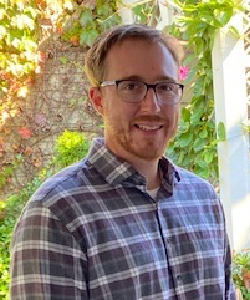
How did you get started in the IC/what inspired you to build a career in national security?
"Growing up, I always had an underlying interest in working within the IC, as I had close family members who built careers within this community. Throughout high school and my early years in college, I was not exactly sure what direction I wanted to take once I hit the "real world." It was during my undergraduate years at Virginia Tech where I had the opportunity to intern at one of the IC agencies. It was there that I became more aware of the sense of mission and service to our country that comes with working within those walls. Upon graduation, I was hired by American Management Systems (AMS) as a developer, working on projects supporting various Department of Defense customers. With a few years of experience under my belt, I realized that I wanted to get back into the IC. I was able to convince my employer to support me for the appropriate clearances and I finally received my tickets.
My first full-time role within the IC was a Business Process Engineer. In this role, I helped stand up various applications within an IC directorate. From there, I slowly ramped back into the development arena supporting Data Engineering. I gravitated to, at the time, a fairly new construct called ETL (Extract, Transform, Load). I served on a few different ETL teams working my way from ETL developer, Scrum Lead, and now as Technical Team Lead at Avantus Federal working on various mission applications and big data environments."
What excites you the most about your job?
"Working in data engineering at Avantus, I think the biggest excitement or sense of achievement comes when you find out that data you had helped bring to the forefront for applications, analysts, and/or data scientists has some form of mission impact. At times, we're dealing with billions of rows, spanning multiple data sets containing many different records. All it takes is for one piece of data matched up to another to potentially make a connection that provides intelligence value. When that happens, it ties the work we do to the mission, provides clarity, and gives a sense of accomplishment."
In the next two-to-three years, what do you think will be the top IC issue/focus/trend?
"I believe we'll continue to see the migration of systems and processes to the Cloud. Hybrid and multi-cloud solutions will become more prevalent with having the ability to choose among multiple cloud platforms. With the increased utilization of cloud platforms, I think we'll also see more focused AI/ML principles being applied to big data problems. "Speed to Mission" will also continue to be a focus. Getting mission-valuable data in the hands of analysts and scientists as quick as possible is a constant focus on data initiatives. There will be a greater focus on tools and technologies that can rapidly take a data set from its raw/source format, transform and condition it based on business requirements, and quickly deliver it to the necessary data consumers."
What one piece of advice would you offer a student considering a career in the IC?
"I advise those considering a career in the IC to maintain patience and flexibility. Patience in that obtaining the proper credentials to operate within the IC world takes time. I would also stress flexibility, in that there are many different projects with different missions and timelines. It may take a few projects to find that right fit...and that right fit may not last all that long. Be flexible with a focus on honing the skills and expertise that interest you."
Favorite TV Show: Is it bad to say Tiger King? I think, like most, I've made my way into the basement of Netflix in trying to find decent things to watch. I've taken the opportunity to revisit my favorite series, Breaking Bad, and I'm now making my way through Sopranos, which, crazy to say, is the first time I'm watching it.
Favorite Podcast: I'll have to also give a shout out to my Avantus co-worker, Chad Kim, and his Connections podcast. He has discussions with industry leaders that are definitely worth a listen.
Veronica Kazaitis
Senior Vice President, Cyber & Intelligence
Parsons
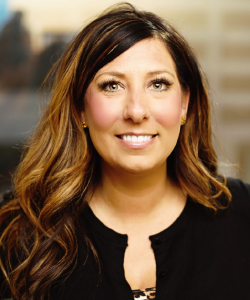
How did you get started in the IC/what inspired you to build a career in national security?
"My father was in the U.S. Army, so I've always felt connected to the importance of the defense and intelligence mission. I studied finance in college, and, when I graduated, was fortunate to start working in the defense industry supporting the Intelligence Community. I focused on growing and learning—both personally and professionally—every day...After working for a few defense contractors, I found my way to Parsons where I now lead the business development and strategy for the company's Cyber and Intelligence portfolio. We're doing truly INCREDIBLE things every day!"
What excites you the most about your job?
"I love listening to our partners in the IC and DoD share what they're focused on, where they see the future going, and what they need to get the job done. The trust that you build with your customer in this role, where they know that they can call on you, is the most rewarding piece of my job. Every day the people in the IC are focused on making a positive impact to our soldiers around the world, and it's our job to help them be successful."
In the next two-to-three years, what do you think will be the top IC issue/focus/trend?
"Embracing Open Source [will be the top IC trend] in the year ahead. Open source is one area where competition is a good thing. Competition promotes innovation, discovery, and additive government value, while only government-owned and developed capabilities risk being trapped in legacy, historical approaches. While there are many benefits around leveraging open source, one that keenly sticks out is the collective development capacity of often highly-skilled engineers who are passionate about the tools they build. They want to make an impact. These projects are often reviewed by hundreds of volunteer engineers and organizations with corporate image and missions at stake. The question is, is the IC ready for adoption? "
What one piece of advice would you offer a student considering a career in the IC?
"[I would tell someone considering a career in the IC to] jump in! Don't be afraid. If you're committed, you will work with the absolute best people in the entire world—all focused on making the world better. There is a sense of camaraderie within the IC where, if you're focused on the mission, everyone is on the same team."
Favorite TV Shows: Lean In: Women, Work and the Will to Lead by Nell Scovell and Sheryl Sandberg. One of my favorite quotes from the book is "There is no perfect fit when you're looking for the next big thing to do. You have to take opportunities and make an opportunity fit for you, rather than the other way around. The ability to learn is the most important quality a leader can have."
Yolanda Craig
Vice President of Cybersecurity, EverWatch Solutions;
PhD candidate, Capella University
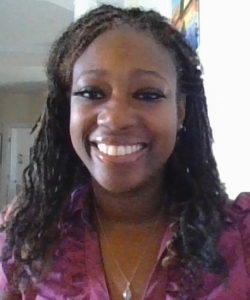
How did you get started in the IC/what inspired you to build a career in national security?
"I was selected, before graduating high school, for the Undergraduate Training Program at NSA. Today is program is called Stokes Scholar. I had no clue what I joined but they said I would enjoy it and the government would help pay for college (I went to Vanderbilt University). I started off as an electrical engineer doing microelectronics and moved through different technologies over the years."
What excites you the most about your job?
"Two highlights of my career: 1) The first time my contributions saved a human life. 2) The first international project that I worked, was across IC agencies and 3 different governments. It was an incredible experience that taught me how to negotiate despite differences in goals and perspectives and I earned a military medal, although I was always civilian."
In the next two-to-three years, what do you think will be the top IC issue/focus/trend?
"Top issues and trends of the year ahead: Cyber (might be biased), technology - 5G and space, and protecting the US critical infrastructures."
What one piece of advice would you offer a student considering a career in the IC?
"Absolutely do it! You can apply for employment or join an internship program. So, get a clearance and contribute, at least once, to national goals and strategies. When you enter into the IC, find a mentor to help you understand the larger picture and also, find a mentor to help you navigate your career. Continue to challenge yourself, and explore the possibilities, because the IC is very diverse and has so many roles that needs to be filled."
Favorite TV Shows: Jack Ryan - I cannot get enough of using your brain to find a solution that was not seen easily.
Laura Ramu
Advanced Manufacturing Lead
Parsons
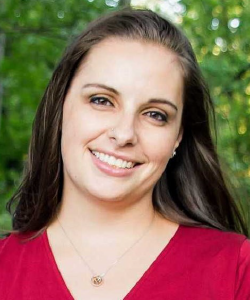
How did you get started in the IC/what inspired you to build a career in national security?
"I started my IC career at an agency providing analysis directly to policymakers and have slowly found myself at earlier and earlier points in the intelligence pipeline, always focused on cutting-edge science and technology applications."
What excites you the most about your job?
"I have loved building Parsons' Printed Electronics effort from the group up—it's such a new field full of limitless applications and potential!"
In the next two-to-three years, what do you think will be the top IC issue/focus/trend?
"I think Supply Chain Security will continue to be a major IC trend in the year ahead, which will push for more indigenous innovations (like printed electronics!) as well as novel solutions to working with international partners in a "zero trust" landscape."
What one piece of advice would you offer a student considering a career in the IC?
"Be open to new challenges. There is so much to do and so many wonderful people to work with!"
Favorite TV Shows: His Dark Materials and Schitt's Creek—They're both enjoyable in very different ways!
Lisa Egeland
Project Manager
LMI
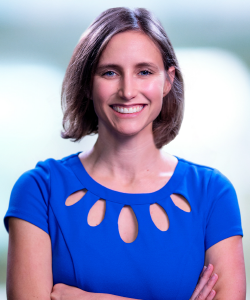
How did you get started in the IC/what inspired you to build a career in national security?
"I started my career in data analysis for Freddie Mac but sought a change after the 2008 housing crisis. My college roommate encouraged me to try the contracting world, and I started doing pricing analytics for an Intelligence Community (IC) customer. Over 10 years and three IC agencies later, I'm a project manager for multiple contracts. My day-to-day responsibilities vary from analyzing website traffic to designing Python coding courses to organizing a conference on IC utilization of data science. The work is always changing and always challenging!"
What excites you the most about your job?
"The amazing government staff and contractors I work with every day inspire me. I'm astonished at the diversity of experience they collectively bring to the mission. I have a team with decades of experience who deliver finished intelligence to customers around the globe. I learn something new from them all the time, and their passion and energy motivate me to be the best professional I can be. I am honored to work with incredible colleagues that care deeply about protecting our country."
In the next two-to-three years, what do you think will be the top IC issue/focus/trend?
"I think the IC is in the early stages of a huge data science movement that is reshaping intelligence analysis. The technological advancements in artificial intelligence, machine learning, and deep learning improve the IC's ability to analyze massive volumes of data much more quickly. Given the limitations of person-based analytics due to ongoing COVID restrictions, incorporating and refining automated processes will be a top priority in 2021 and beyond. In my experience, these trends go in five-year cycles, by which time 'the next big thing' arrives, but for data science, we're still getting started."
Favorite TV Show: The Expanse—Aside from being visually stunning, I love how the show's portrayal of technology seems completely believable for 300-plus years in the future, which is a rarity in sci-fi. Plus, Shohreh Aghdashloo is just absolutely phenomenal!
Regan Prince
Vice President of Operations/Program Manager
Amentum
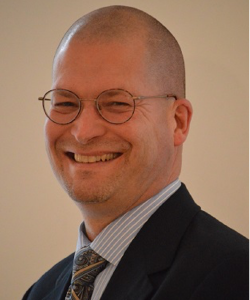
How did you get started in the IC/what inspired you to build a career in national security?
"My start in the IC was completely unplanned. For most of my early career, I executed large engineering and construction projects in the automotive, pharmaceutical, and oil and gas markets. A colleague from early in my career contacted me one day in 2011 and requested my support troubleshooting a construction project as part of a very large critical infrastructure upgrade program for an IC customer. He suggested it would only take four weeks, but as with most TDY assignments, the end date kept pushing out. I subsequently assumed the leadership role for the entire program, and continue to support the IC."
What excites you the most about your job?
"I have operational responsibility for more than one large program, but the Program Manager role of a fast paced and dynamic Operations and Maintenance contract drives the day, and my day starts early. I typically arrive before our first shift begins and clear any critical correspondence. I attend an early morning virtual meeting to share safety topics with our managers and to establish the known priorities for the day. The balance of my day includes checking in with my other programs, attending virtual or small group operational meetings with corporate and client leadership, and addressing the unknown priorities that inevitably surface each day in this dynamic environment."
In the next two-to-three years, what do you think will be the top IC issue/focus/trend?
"The fluid nature of the IC mission ensures each day and each customer is different. I love my job, and the numerous opportunities I am afforded each day to support my customers. The rapid advances in technology allow us to address and resolve challenges using tools and techniques not available even a few years ago. Our ability to share, analyze and act on information across the IC continues to increase with each technological advance."
What one piece of advice would you offer a student considering a career in the IC?
"The application of machine learning and artificial intelligence as tools to increase the collection and analysis of big data will continue to evolve. The application of these technologies will vary depending on the mission specifics of the IC organization, but the development and use of these technologies for mission applications is here to stay."
Favorite Book: Life 3.0: Being Human in the Age of Artificial Intelligence by Max Tegmark
Favorite TV Show: Bosch
Paul Rogers
Program Manager, Empty Pockets Program
Amentum
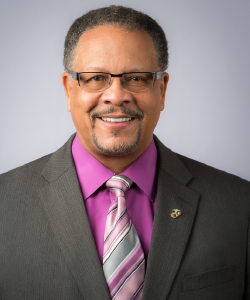
How did you get started in the IC/what inspired you to build a career in national security?
"Upon retirement from a career in the US Marine Corps, I was recruited to work as a Program Manager (PM) on a large project at the Office of Naval Intelligence (ONI). This position and experience led me to support other agencies such as FBI, DIA, NGA, CIA, and NSA throughout my career. I am currently a PM with Amentum supporting the physical security program for NSA, which is responsible for access control at all NSA building locations in several other state locations."
What excites you the most about your job?
"As a PM my day starts off with reviewing the day and connecting with my site managers and supervisors at the different locations we support about what happened late in the evening or overnight that is of importance and needs to be addressed up my chain. Then the day continues with routine meetings, customer interface, and personal interaction with the workforce throughout the program."
In the next two-to-three years, what do you think will be the top IC issue/focus/trend?
"It's exciting to see the new influx of energetic and bright young people starting their careers in an excitingly new world of technology and challenges. [It's also exciting to see] all the new technological advances our community has made in the past several decades and the constant adaptation of these services by the workforce. I see the younger versions of myself and my colleagues and we once thought we were the best and the brightest (we were at that time)...How times have changed and so have we."
What one piece of advice would you offer a student considering a career in the IC?
"The future brings a bundle of challenges for the new workforces and the IC because the methods of technology and violations of privacy and security are huge...It is imperative that the IC remains totally dedicated and vigilant in expanding their knowledge of how to protect this nation and our democracy. We are trending towards virtual intelligence (VI) and artificial intelligence (AI) which will dominate the entire community of the IC and the way we live our lives every day."
Favorite Movie/Book/TV Show this year: Black Panther (movie)/Say It Louder (book)/Homeland (TV show)
Brad Millick
Director of Counter Insider Threat
Department of Defense
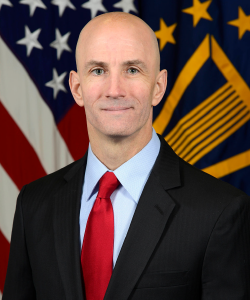
How did you get started in the IC/what inspired you to build a career in national security?
"As a young professional entering the workforce, I wanted to be directly involved in pursuing and preserving our Country's national security mission. Thus, when I graduated from college, I took a position in an engineering and program management training program with the Navy. I had always wanted to get closer to the top echelon of leaders to see first-hand the decision making process and be positioned closer to the arena of intelligence. So, I completed multiple graduate programs encompassing several different fields part-time at night. Additionally, I took on every project, rotation or developmental assignment I could to broaden my skill set and network. It took about 10 years after graduating with my Bachelor’s degree - but, because of my diverse rotational experience and networking, I got hired as a staff officer working Congressional Affairs and project evaluation on intelligence programs."
What excites you the most about your job?
"My job is a mixture of two different requirements. First, I serve on the SecDef's staff as one of his Senior Leaders. So, my primary job is to keep him informed and prepared to make the best decisions on any topic in my area of responsibility. Second, on the Secretary and Under Secretary's behalf, I manage a staff which oversees and leads a global Counter Insider Threat Enterprise - which includes several critical functions, such as: budget development & execution, congressional support, professionalization, policy development, and operations oversight."
In the next two-to-three years, what do you think will be the top IC issue/focus/trend?
"The world is so dynamic, fast paced, inter-connected and complex that the fields of intelligence and security are absolutely relevant (ie., they are needed to maximize decision space and opportunities for positive outcomes). In addition, since the end of the cold war; the threats (and number of them), alliances, world stability, and needs/solutions from the IC are not linear or predictable. Thus - keeping the Country secure with the best capability, analysis, and operations is like a three dimensional chess match - intellectually complex and a big challenge"
Favorite video this year: Most Leaders Don't Even Know the Game They're In by Simon Sinek
Joe Chioda
VP Account Management
ManTech International Corp

How did you get started in the IC/what inspired you to build a career in national security?
I “fell into” working in the IC based upon an epiphany one day that changed my life. I had already been established in a career as a professional Chef, having worked in restaurants beginning at age 12 and attending the Culinary Arts curriculum at Johnson & Wales University in Providence, RI. I think I woke up one day after an arduous work week and decided, 'I just can’t do this anymore'...that week I went to the recruiting station, marched up to the Air Force desk and said, 'I’d like to look into joining up.'
So off I was for six-months of training at Keesler AFB, Biloxi, Mississippi in SIGINT collection methods...My Air Force training took me to the Foreign Technology Division at Wright-Patterson AFB, Dayton, OH (FTD, now NASIC) where I worked SIGINT issues; Osan AB, Korea where I worked with the U2 mission; and finally, the Strategic Air Command in Omaha, NE working with data from the SR-71 and RC-135 collection platforms.
At the end of my 6-year enlistment (and getting married along the way), my spouse and I determined military life was not for us, again leaving me with a career path decision. As I tested the waters of using my clearance and military background in SIGINT, I reached out to a Lockheed contractor I had befriended during a military assignment, who introduced me to a manager in a company that had IC business, HRB Singer in State College, PA (which was later bought by E-Systems, subsequently bought by Raytheon). Based on that connection, I got my first IC job as an Intelligence Analyst on a Washington DC-based contract.
Fast forward many years, different job titles (engineer, program manager, BD/Capture Lead, Chief Growth Officer) supporting NRO, NGA, DIA, ONI and NSA customers, and the acquisition of BS in Computer and Information Science and 2 masters degrees (all accomplished through night/weekend classes while raising a family), here I am at ManTech, overseeing the activities of a Business Development organization that works with multiple Intelligence Community customers.
As a long-term defense contractor in the IC, it seems no day is ever quite the same and I think it’s been that way throughout my 30+ year career! Today, as a leader of a very dynamic part of ManTech’s Business Development organization, it’s my duty to serve those whose job is to help bring our expertise to our IC customers. In this context, my day may include making sure my team has the resources necessary to accomplish their daily tasks and empowering them to carry out those tasks to the best of their abilities; reviewing and prioritizing opportunities we may be qualified to bid; or helping Account Leads in developing strategies to win new business. In addition, as a leader in this company, I need to keep my management chain aware of any issues, opportunities, or problems so that together we develop strategies and tactics to solve them and grow the business, while simultaneously ensuring we provide our IC customers, and the nation, with support and solutions to help them fulfill their missions.
Favorite book this year: Grit by Angela Duckworth
Doug McGovern
Associate Partner
Intelligence Application Development and Innovation
IBM
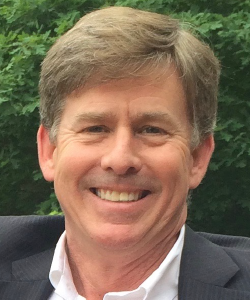
How did you get started in the IC/what inspired you to build a career in national security?
"My career began working for the Navy in Submarine Special Projects...one thing led to another and I ended up jumping from 'innerspace' to 'outerspace' vehicles in the IC."
"Although I've made the transition from Government to Private Sector service, my day starts like every day, looking for ways to help serve and protect this great country we live in. While the COVID period has certainly affected the logistics of going into the office every day, I am still invigorated by the challenging work and passionate team members that constantly call us to think, innovate and collaborate in our IC mission."
What excites you the most about your job?
"I think there continues to be tremendous opportunity to keep the IC at least two steps ahead of our adversaries...our ability to extend technology or simply innovate towards solutions that provide the IC advantage has been in our DNA for decades, and it is still there today."
In the next two-to-three years, what do you think will be the top IC issue/focus/trend?
"Although COVID will dominate the headlines, I think the toughest issue we face and will face going forward is "Trust"...how do we come to trust data in the era of fake news, trusting the workforce based on recent insider threat compromises, trusting the machines when AI solutions can be manipulated. The voracity of our environment is subject to questioning more than ever, so the who, what, where, why, when and how we build and sustain trust with ourselves and our customers is going to be a tremendous challenge."
Favorite Book this year: Duty: Memoirs of a Secretary at War by Robert Gates
Julie Ard
Principal Insider Threat Researcher
Noblis
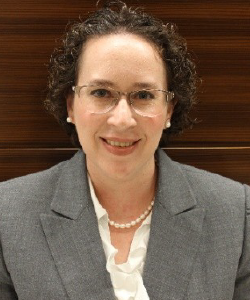
How did you get started in the IC/what inspired you to build a career in national security?
"My first interaction with the IC was in the context of developing and fielding advanced research developed by DARPA. I went on to support several different intelligence agencies’ cyber security research and operations throughout my career."
What excites you the most about your job?
"I’m a Principal Insider Threat Researcher. I collaborate with several departments and external organizations to ensure that the technology can provide the information vital to our leaders’ decisions on protecting agency assets, including personnel, from internal threats. My typical day includes learning new things, developing technological and policy solutions, and learning how to interact with other stakeholders in order to effectively implement them."
In the next two-to-three years, what do you think will be the top IC issue/focus/trend?
"People of several different affiliations serve the IC, and ensuring that they can work cohesively is an incredible challenge. A serious issue is how IC contractors are impacted by government shutdowns, furloughs, and the reduced manning resulting from the COVID-19 pandemic. These cuts in hours cause financial stress for these important contributors to the IC who have access to sensitive information, and financial stress is the biggest cause of insider breaches. So it’s important to consider these issues when implementing new procedures during these extenuating circumstances which are unfortunately becoming more and more common."
Favorite TV Shows: Ozark and Breaking Bad "because they show how normal people get sucked into bad situations. This is the majority of situations that I encounter in my profession as an insider threat leader."
Kyle Rice
Chief Technology Officer
SAP National Security Services
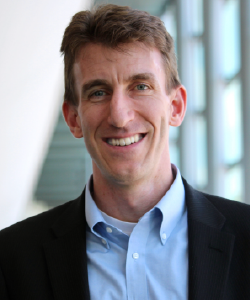
How did you get started in the IC/what inspired you to build a career in national security?
"I began working in the IC primarily based upon geography. I went to college in DC. When I graduated and was looking for a job as a coder, I interviewed mostly with systems integrators. My first job was at the Pentagon so I ended up getting cleared and that got me exposed to the sorts of really fascinating problems that exist in the government space so I never left the community."
"I work for SAP National Security Services (SAP NS2) - we are the subsidiary of SAP that focuses on the US secure community. As CTO, I have a really great job because I get to figure out how to take the best of the commercial technology that SAP has and apply it to problems that exist in the US secure space. So a typical day involves talking with IC customers about what's keeping them up at night, and then designing a solution based upon proven commercial technology to help address their issues. It’s rewarding because it lets me sit at the intersection of commercial speed and key government problems."
What excites you the most about your job?
"I’m excited about the increasing willingness of the IC to leverage commercial technology. For a while this wasn’t the case, and that made it hard for the government to leverage all the technology investment that takes place on the commercial side. The problem with that is the IC has the most pressing problems, so we need to have the best technology pointed against those problems. If, instead, the smartest minds in industry are focused on how to increase the probability of you adding one more thing to your shopping cart then that’s not a great situation for our national security. But if we can apply that same technology – and hence those smart minds and investment – toward helping to determine links between terrorism actors then we are all in a much better place"
In the next two-to-three years, what do you think will be the top IC issue/focus/trend?
"[The top IC issue of this year is] COVID, but in particular the response that the government has to supporting the IC workforce. A lot of IC work simply can’t be done at home, and facilities being closed has caused a lot of uncertainty for the workforce. The government needs to make it clear that the IC workforce is our greatest IC asset and that they will be protected and supported in a manner that reflects that importance."
Favorite Book: The Passage by Justin Cronin
Susan Oakley
Senior Director, Business Development for Regulated Industries
Microsoft
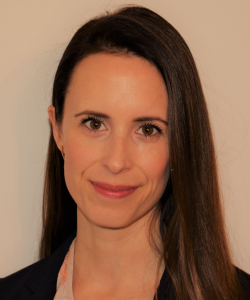
How did you get started in the IC/what inspired you to build a career in national security?
"My first job out of college was as an Image Scientist with NIMA (now NGA). On my first day of work, taking a cab to Building 213, the driver asked multiple times if I had the correct address. Who would have guessed that a few years later it would be home to the Washington Nationals? As an Image Scientist, assigned to the offices of counterterrorism and later counterproliferation, my role was to determine when and how image-based satellite data could be used to solve challenging IC issues. Over time, I gravitated toward leading teams of image and geospatial scientists, which led to leadership roles with BAE Systems. There I dove much more into the strategy behind answering some of the most challenging questions facing the IC, such as 'How can we better serve our clients long term?' I’m thrilled to carry that sense of mission to Microsoft in order to lead strategy and emerging opportunities across the Federal government."
"The only thing that’s 'typical' about my workday is that it changes constantly, which I actually love and thrive on. The other constant is the pervasiveness of calls throughout the day. Fortunately, with the right productivity tools, we’ve been able to stay highly effective and well-connected despite the hurdles of working remotely."
What excites you the most about your job?
"What excites me about the IC today is its steady march toward tech modernization, from creative ways to develop and deploy capabilities to embracing greater cloud computing."
In the next two-to-three years, what do you think will be the top IC issue/focus/trend?
"COVID-19 has dominated 2020, and obviously the IC is deeply affected. Being able to maintain workloads, protect data, and collaborate across distance are seminal challenges that the community is rising to meet during this pandemic and beyond. A recent NYT article reported that, paradoxically, many organizations are experiencing higher levels of productivity from staff. The big question is: How long can it last? "
Favorite Podcast: How I Built This
IC Role Model: Sue Gordon
Teresa Shea
Vice President
Cyber Offense and Defense Experts
Raytheon Intelligence & Space
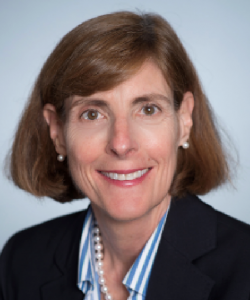
How did you get started in the IC/what inspired you to build a career in national security?
"I had a fresh Electrical Engineering degree from Georgia Tech, a husband and a new baby. I was looking for part time work and NSA, where I had done a summer internship, offered me that opportunity. Once I got on board, I quickly became “hooked” on the mission. I loved saving lives with Signals Intelligence!"
"Are these days typical? I hope not! I miss the collaboration that comes from being in the office with my team. My days are a mix of dealing with “pop up problems” (tactical issues) and trying to keep the organization focused on our strategic goals of getting capability into operations faster than our adversaries. As a nation, we are losing that race and it worries me."
What excites you the most about your job?
"I’m excited to see the diversity at the highest levels across the IC. I get to introduce two of these stars, Ellen McCarthy (Dept. of State) and Stacey Dixon (NGA) at the Sisterhood of Spies event on July 10th. These two superstars are two more examples of diversity making a difference for our Nation. The national security mission requires curiosity and critical thinking, and diversity naturally brings both of these elements. We need more!"
In the next two-to-three years, what do you think will be the top IC issue/focus/trend?
"Of course my answer to this is going to by CYBER! I’d reference the recently published Cyberspace Solarium Commission report, specifically page 8, which is the beginning of a thorough THREAT section. The report highlights the Major US Public-Sector Cyber threats to critical infrastructures such as our financial systems, energy resources and water supplies. It then goes into the State sponsored threats from China, Russia, Regional Powers, Iran, and North Korea. The non-state Cyber Threats are just as concerning as criminals find the bar to entry low and little consequences for their actions. This report calls for specific measures to address this threat and I am looking forward to us executing on these recommendations."
Favorite Book: The Splendid and the Vile by Erik Larson
Laine Klein
Senior Vice President, Global Mission Solutions
Amentum
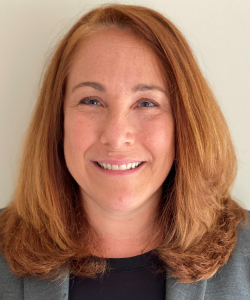
How did you get started in the IC/what inspired you to build a career in national security?
"My first job in the area was with a company called Anteon where I worked on the CENTRIXS program. We engineered and built intelligence sharing classified networks with our coalition partners around the world. This was very specific to providing secure communications but it exposed me to the importance of intelligence to the mission and equally the criticality of foreign partners in the execution of U.S. national interests. This role allowed me to travel around the world working closely with military intelligence personnel and our partners during Operation Iraqi Freedom. It was an enlightening time for me as I had no government or military background and I learned a lot about the critical role these people play in keeping the rest of us safe."
"...After checking email and responding to critical actions, I go about the day checking in with my program managers and other leads. I prefer to visit my teams onsite as this is where the important work is done and allows me to interact with my team and my IC customers, so I may travel to MD, VA or jump on a plane to one of the remote locations. During the pandemic, travel has been severely limited, so I spend about 12 hours a day on the phone calling my team members to ensure they are safe, supporting their customers and providing them with whatever help they may need."
What excites you the most about your job?
"The opportunity for collaboration enabled by technology is greater than ever. On the other hand, there is so much data, the opportunity to miss critical information is also great. What is exciting are all the tools entrepreneurs and creative thinkers are developing to help the Intelligence Community gather and analyze critical information. We need technology to ensure the best information is provided to policy makers, IC directors and military commanders in real time. We have an opportunity to address critical issues and take action more quickly than ever."
In the next two-to-three years, what do you think will be the top IC issue/focus/trend?
"The top news story has to be about the pandemic since it has had an impact worldwide. There is a lot to learn from what has happened with COVID-19. From gathering and responding to unusual activity in other countries, to taking action, to supply chain availability. Even more importantly though has been the impact to the Intelligence Community as a whole. The distraction of the pandemic has been huge, but aside from that, the intelligence community has the additional challenge of not being able to work remotely due to the nature of the work. Developing communication solutions, processes and policies to ensure the critical mission of the Intelligence Community can continue seamlessly in the event of a worldwide disaster will continue to be an important focus for the IC."
Favorite TV show this year: Declassified: Untold Stories of American Spies
Michael Tillman
Department Manger,
Information Warfare and Cyber Survivability Solutions Business Unit,
Northrop Grumman Mission Systems
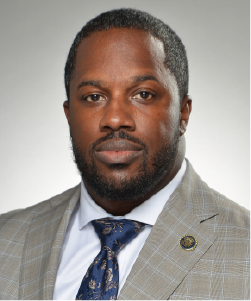
How did you get started in the IC/what inspired you to build a career in national security?
"I began my career in support of the U.S. Intelligence Community (IC) in 2005 as part of a Northrop Grumman program team. Prior to assuming this role, I served in the U.S. Marine Corps and worked in law enforcement. I was three years into my role as a security analyst at Northrop Grumman when I learned the program was looking for someone with my cyber skillset to join their team...Fifteen years later my passion for the mission remains unchanged, and I am proud to have built a career at Northrop Grumman serving the IC."
"Currently, I work as a department manager for Northrop Grumman’s Information Warfare and Cyber Survivability Solutions business unit. In this role, I lead a team of program managers, and my typical work day includes meeting with staff to ensure the timely delivery of customer priorities and the successful execution of mission objectives. I also partner with our business development team in support of upcoming captures and business pursuits. Probably the most important parts of my job are employee development and customer engagement. I once attended a training where the facilitator told the class to 'cherish being mentored and strive to be a mentor to others.' I took those words to heart, and I spend a lot of time mentoring young professionals on my team and across the Northrop Grumman organization, especially in the Employee Resource Groups where I am an active member and advocate."
What excites you the most about your job?
"Undoubtedly, it’s the mission followed by the amazing people. Because of the unique nature of working in the classified mission space, I may not be able to share details about my work with friends and family, but knowing that I am helping solve the nation’s hardest problems that will ultimately protect and save lives, gives me a great sense of pride."
In the next two-to-three years, what do you think will be the top IC issue/focus/trend?
"I am looking forward to the How Diversity and Inclusion Drive Innovation panel [as part of The New IC]. As a leader, I know first-hand the critical role that diversity and inclusion plays in innovation. Teams from varied life experiences and from different backgrounds, will come at problems differently, which can spur the next technical achievement or life-saving solution. Moreover, as we look to build a pipeline of future intelligence professionals ensuring that we recruit women and people of color is critical. We also need to introduce diverse groups to our profession early, which is why I take advantage of any opportunity to talk to K-12 and college students. I want them to know a career in the IC is great way to make a living and have a meaningful impact on our country and world."
Allison Andersko
Director, Space Mission Solutions
Lockheed Martin
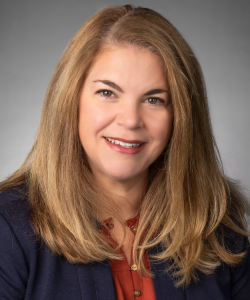
How did you get started in the IC/what inspired you to build a career in national security?
"My entire career has been in support of the Intelligence Community. I started my journey at Lockheed Martin as a summer intern while majoring in Computer Science at Villanova University. I couldn’t believe they paid me for a summer job where I had so much fun! Between the quality of work, and the welcoming family-like environment, it didn’t take much convincing for me to continue at Lockheed after graduation. My career supporting the Intelligence Community progressed through software development, leadership, and program management roles before landing in my current position 23 years later."
"The positions we work in the defense industry are no longer 8x5, 40-hour weeks with standard core working hours. As the Intelligence Community embraces change in the way it delivers solutions, it is exhilarating to see how Lockheed Martin implements new, varied ways of doing business while placing high value on life balance. Part-time working mothers hold leadership positions; telecommuting is encouraged and applauded; training and career development resources are more available than ever. Each individual brings unique value, and it is imperative for leaders to mine that value, provide opportunity, and support growth."
What excites you the most about your job?
"What excites me most about working in the Intelligence Community is the continual need to adapt to offset and overcome adversary capability. As we, across industry, solve our nation’s hardest problems, we must tap into our diverse resources and perspectives in order to bring forward best solutions and pave the way for growth and continued national security."
Andrew Borene, JD CISSP
Cybersecurity Consultant;
Fellow at Georgetown Center for Security Studies;
Senior Fellow at George Mason National Security Institute
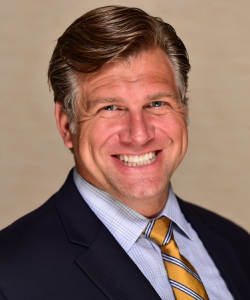
How did you get started in the IC/what inspired you to build a career in national security?
"My first job in the intelligence community was as a Marine Corps officer in 2002. When I deployed to Iraq under General James Mattis with the First Marine Division in 2003, I had the opportunity as a young lieutenant to learn from some legends in military combat intelligence including officers like Jim Howcroft, Michael Groen, and Tim Oliver. Among other things, they taught me that the first responsibility of any intelligence officer is to provide “timely, actionable and relevant” reporting to the supported commander, which makes it a customer-service role.
...After the Marines, I attended law school in Minneapolis but stayed involved in intelligence related issues as a summer clerk for a federal judge who had some counterterrorism matters on his docket.
...Later, I was appointed as an Associate Deputy General Counsel at the Pentagon to assist with counterterrorism litigation and to support intelligence community assessments about some of the most dangerous detainees held at Guantanamo Bay.
Since then, I’ve been involved in all kinds of IC work I never would have expected. I’ve been a program manager for open source intelligence, an industry executive at companies that provided things from robotics for SOF operators to software for analysts. I had some amazing experience as a senior advisor to IARPA where I got to learn from some of the world’s leading experts on breakthrough scientific programs with a very wide aperture."
What excites you the most about your job?
"Both the people and the mission. I love seeing the increasing diversity of people in the IC, it’s been wonderful to see more women and minorities leading national agencies and serving in new ways across the enterprise. As for mission - It’s the shared patriotism, integrity and willingness of the people to collaborate that ensures the IC will improve our country’s performance from combat operations to informing wise national strategy. Bottom line, I just love working with people who also want to drive decision advantage in order to prevent US personnel from finding themselves in a “fair fight” with any adversary who means us harm."
In the next two-to-three years, what do you think will be the top IC issue/focus/trend?
"Aside from learning how to work effectively from home in 2020, I suspect we’ll see the continued resurgence of “Great Power Competition” and an increase in “gray zone operations” or what’s sometimes called low-intensity conflict or hybrid warfare. As a result, I predict we will see a significant shift toward CI, security, public-private-partnerships and efforts to counter nation-state threats from both China and Russia around the globe. We’ll also probably see increased technical expertise to support US victories in the cyber domain and in space."
Favorite Movie This Year: The Russian Five
Lina Abisoghomyan
Senior Business Analyst
Strategy & Analytics, Government and Public Services
Deloitte
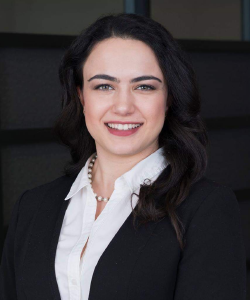
How did you get started in the IC/what inspired you to build a career in national security?
"My interest area more generally has always been in international affairs, and I began to explore that through internships and fellowships throughout high school and college...I think the cherry on top was when I decided to concentrate my degree in International Relations in Foreign Policy & National Security. I had an amazing capstone course professor and thesis mentor who was a high-up in the IC, and I began my first job out of college at the Pentagon shortly after graduating. From there, the rest is history!"
"My ‘North Star’ in my role as a strategy consultant is to support the client in making data-driven decisions that help address their short-term needs, and long-term goals. I work in teams to solve our clients’ most pressing, high-impact issues - helping them to efficiently and effectively conduct daily tasks as well as plan for future milestones. Day-to-day, I work together with a team of data analysts to understand, interpret, and analyze what the data they aggregate and model is telling us. I then work with my peers in strategy to devise, design, and help to facilitate the implementation of a plan using insight from that data, along with market research and industry knowledge, to deliver results."
What excites you the most about your job?
"I’m most excited about the increased adoption of technology for diversified application. There are so many challenges that come with increased technological integration into our daily solutioning, but it makes me that much more excited to think about what’s on the other side once these challenges are overcome. I’ve seen what seems to be a great change in culture towards ‘technologization’, and an openness to learning about and embracing ameliorated modernized solutioning."
What one piece of advice would you offer a student considering a career in the IC?
"Perhaps unsurprisingly, I would say COVID-19. There are a lot of effects that are already apparent, such as the increased use of technology, or the redefinition of human connection and interaction but there are so many ripple effects that are yet to come. In the intelligence community specifically, because of the unique circumstances of the work that is being done, I think these ripple effects will be that much more complex and difficult to fully predict."
Favorite Podcast: 30 Animals that Made Us Smarter (BBC)
Niloo Norton
Senior Modern Workplace Specialist
National Intelligence Division
Microsoft
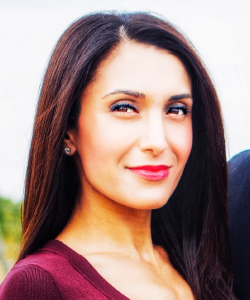
How did you get started in the IC/what inspired you to build a career in national security?
"During my career at Microsoft, I have served in two different roles working with National Intelligence agencies. In my former role as a Licensing Specialist I worked on simplifying complex licensing models, which helped the Community modernize procurement of their Microsoft technology, reduced contract costs and enabled the Community to leverage advanced capabilities such as Artificial Intelligence and Machine Learning in tackling the Intelligence Mission. As the adoption of cloud continued to grow in the Community, my career and skillsets developed further with a focus on AI-based cloud solutions."
What excites you the most about your job?
"From the moment I wake up until the moment I go to bed, I am customer obsessed. My days begin early, knocking down two or sometimes three cups of coffee as I triage through emails and set priorities for the day. On days I do not have meetings in government facilities, my team meets with customers in our local Microsoft office. Throughout the day I also spend time connecting with new contacts within the industry through LinkedIn. Staying connected with others helps me stay on top of industry and government news. As my day comes to a wrap, my last conference call is typically a team training session about new cloud features and how these capabilities solve mission problems."
"What excites me the most about the Intelligence Community today is how resilient the workforce is with responding to a global pandemic. At the peak of our current crisis with COVID-19 the Intelligence Community pivoted with the use of innovative technologies in order to continue operations and to keep our country safe. Additionally, I'm proud to witness the diverse & inclusive culture embedded across the Community with an understanding that our success in fighting the war on terror is not possible without a dynamic & diverse workforce."
In the next two-to-three years, what do you think will be the top IC issue/focus/trend?
"I imagine the challenge of supporting remote work will remain a top priority across the Community as the shift to unclass operations increases for future state."
Favorite Book: Something Needs to Change: A Call to Make Your Life Count in a World of Urgent Need by David Platt
Stephen Gillotte
CEO & President
Reinventing Geospatial, Inc.
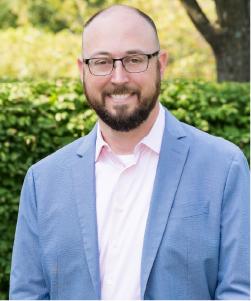
How did you get started in the IC/what inspired you to build a career in national security?
"After high school graduation, I took my first internships supporting the Intelligence Community and the U.S. Army. It was during this time that I worked on the persistent surveillance piece of the Global Hawk program...After college, I found an opportunity to work with my father, who was a mathematician and computer scientist at Northrop Grumman Information Technology, TASC, and I quickly jumped on it.
...While at TASC, I progressed through the ranks from Technical Lead to Section (Line) Manager, followed by Deputy Program Manager/Chief Architect, International Capture Manager, and finally Portfolio (Department) Manager, where I managed a $29.5 Million/Year Army geospatial line of business.
...In 2009 at age 30, I felt as though I could contribute so much more to the community and founded Reinventing Geospatial, Inc. (RGi), where we focus on helping both military and national intelligence agencies achieve mission success. Back then, and still today, I refuse to accept the status quo…I know we can do more and be more. Over the past 10+ years as CEO, I have continued to follow my passion toward making an impact, and it’s been one of the most challenging and rewarding roles I’ve ever served in."
What excites you the most about your job?
"What excites me most about the IC today is how many advancements are being made across the board that are all converging at the same time—from AI/ML to Data Science, Sensors, Computing platforms, Cyber Command, Space Command, the multi-domain conflict of the future, etc.—all of these things are speeding forward at such incredible rates that the IC will be unrecognizable in five years. They key to success will be how well we can accelerate the decision-making process, which requires a level of Human-Machine Teaming we are still working towards. In order to gain real advantage, we’ll need hypersonic thinking."
Favorite Book: Right Way & All at One: Five Steps to Transform Your Business & Enrich Your Life by Greg Brenneman
Ray Ivie
Senior Vice President
CACI
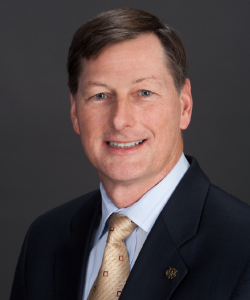
How did you get started in the IC/what inspired you to build a career in national security?
"I was a Naval aviator for 23 years, flying off aircraft carriers around the world. During my squadron and operations staff tours, I was a user of national intelligence in the Middle East and Adriatic and in some cases contributed to national intelligence. Once I retired from the Navy, I joined L-3 Communications in TX working on a SIGINT program for the USAF affecting tactical and national missions. I moved back to NVA to work for BAE Systems on the Navy’s DCGS program and then to GD. At GD I led programs, and later business development, for NGA and NRO programs and accounts. I left GD to go to LGS Innovations (formerly Bell Labs), where I had the pleasure of leading a group of businesses working across most of the Intelligence Community on mission technologies and solutions with some of the smartest people and cutting edge technology I’ve ever seen. In April of 2019, LGS was purchased by CACI and I formed the networks operations group leading multiple divisions providing end to end IT networking including infrastructure and operations/sustainment programs for DoD and the IC. "
"My job is to help others do their job. I ensure that my folks receive the resources they need to do their mission, including staff, training, facilities, equipment, R&D, partnerships and finances to meet or exceed our contract agreements and our customer’s missions. At the same time, I provide the strategic guidance and work with my team on business roadmaps to ensure we meet our contract and financial objectives for the company and its shareholders. The third piece is looking for growth through technologies and capabilities to win new customers and expand into adjacencies."
In the next two-to-three years, what do you think will be the top IC issue/focus/trend?
"With COVID-19 upon us, telework and working outside of Gov facilities will grow. We are learning how much can be safely done outside of a SCIF and contractor facilities. Having everyone in close quarters is not the only solution going forward. AI and ML will also be a hot tech to enable the workforce to be more efficient and analytical while applications do the routine operations."
Favorite Book: Call Sign Chaos: Learning to Lead by Jim Mattis
Mary Quinn
Consultant, Government & Public Services
Deloitte
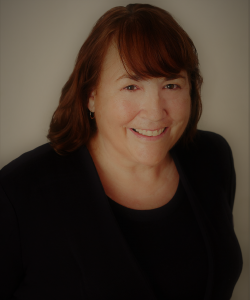
How did you get started in the IC/what inspired you to build a career in national security?
"After college I was commissioned as a Military Intelligence officer in the Army. I served as a Latin America analyst at Ft Bragg and in Washington, DC. I got off active duty and went to graduate school at Stanford for a degree in Latin American History (I did things in reverse order!). I came back to the DC area to teach high school and, after 4 years, I applied for a job with Defense Intelligence Agency and was hired as a civilian analyst. During my time at DIA, I worked as an analyst, collection manager, program manager with assignments in Miami, FL; Newport, RI and multiple locations around the DC area. I retired in 2017, took several months off and started working as a consultant with Deloitte in 2018."
"Before the Coronavirus, I spent most days working at DIA headquarters splitting my time as a senior advisor for our Deloitte team supporting the CIO and meeting with other DIA organizations to check on the status of other firm projects (for example Human Capital, Science and Technology, JCS/J2) to make sure our efforts were on track. As a retired DIA executive, I am able to provide background and context for questions from my Deloitte colleagues on how missions and organizations are related within the agency and in the larger IC."
"The IC must contend with a diverse set of challenges to national security, which is different than it was when I started out when almost all of the focus was on the Cold War, and there seems to be a growing realization of the importance of including diverse viewpoints on how to address those challenges. I think the IC is much warier about the dangers of group think and more willing to listen to different voices which is good news for the job security of intelligence analysts."
In the next two-to-three years, what do you think will be the top IC issue/focus/trend?
"I predict that effectively using classified information and publicly available information to develop more detailed understanding of threats to national security and machine learning and augmented artificial intelligence assisting intelligence officers and policy makers to understand the world around them will be top IC issues this year."
Favorite Books: Say Nothing by Patrick Radden Keefe and Bad Blood – Secrets and Lies in a Silicon Valley Startup by John Carreyrou
Cody Barrow
Product Leader
EclecticIQ
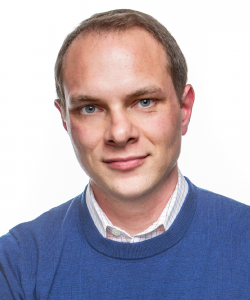
How did you get started in the IC/what inspired you to build a career in national security?
"The U.S. Air Force was my first job. I started at the National Air and Space Intelligence Center in Ohio...The DIA hired me as a federal civilian after my tour in Washington, DC., and I shortly thereafter pivoted off of that to join U.S. Cyber Command's predecessor organization, the Joint Task Force - Global Network Operations, and subsequently help stand up U.S. Cyber Command to become one of the command's first intelligence officers at Fort Meade...
I transitioned to the private sector in 2014 and translated my government intelligence experience to an angel funded stage startup, helped build and lead a world-class cyber intelligence team at a Fortune 20 financial institution, and eventually applied the same experiences along-side my commercial experience to switch career tracks into Product Management building software and services for commercial cyber intelligence vendors and startups."
"Product management means you're interacting with every aspect of the company. You're an octopus with tentacles everywhere but no serious strength; you work on influence. A day means meetings with engineers, the company's chief executive, customers, designers, sales personnel, and others...I apply the military planning, analytic, and leadership skills I learned in the IC every day—the "holy trinity" of the analyst, planner, and operator translates beautifully to the diversity of professions I deal with each day in product management."
"The IC today has to find its place, has to compete, and has to capitalize on the new world disposition where the rules are being actively rewritten, have no precedent, or don't exist. I envy the excitement and challenge of what's ahead for IC newcomers today."
Favorite Podcast: Pivot with Kara Swisher and Scott Galloway
Wyetta Morrow
Director, Human Resources
Raytheon Technologies
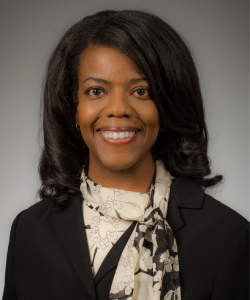
"I currently serve as the Human Resources Director for our Command and Control, Space and Intelligence business (within Raytheon Intelligence & Space) where I am responsible for developing and delivering the HR strategy for global workforce of 5,000 employees and leading a matrixed HR team in executing strategy. This broad portfolio supports the Intelligence Community, DoD and Civil Agencies."
"No two days are alike. There are weeks where I spend the majority of my time in program, operational, strategy and financial reviews; and some weeks could include a talent development or talent acquisition review, meeting with a government customer, or team meeting. I try to prioritize time to spend making sure our business HR team is providing the highest level of engagement and guidance to each of our unique business areas. We are in the people business and no matter what the topic, the primary subject comes down to the employees we have supporting our customers' missions."
"I'm excited about the intelligence community focusing on finding new and different ways to develop the next generation leaders by creating pipeline programs focused on skills in STEM. This focus is needed to ensure we continue to provide the best solutions to our warfighters. Raytheon Intelligence & Space created a fellowship program where we partner with universities to establish a pipeline program where interns obtain their clearance during their internship and once they have completed their degree programs, they are converted to a full-time employee where they will continue supporting missions critical to the IC."
Favorite Books: I have two recent favorites: Call Sign Chaos: Learning to Lead by Jim Mattis (2019), former United States Secretary of Defense, Gen. United States Marines (ret); and What I Know for Sure by Oprah Winfrey (2014).
John Lewington
Business Development & Strategic Partner Sales
National Security Group
Adobe

"My first exposure [to the public sector and the IC] came through investigating the latest technologies for biometrics capture, understanding the 'frontline' and 'downstream' impacts, and secure interoperability between the FBI’s and DHS’s biometric systems. However, my most memorable DoD and IC experiences came from overseeing sales, global professional services, strategy and business development, and product engineering for a variety of commercial enterprise cybersecurity and secure information sharing technologies"
"As a father of three girls, I was looking for better work life balance and made the decision several years ago to pivot to Adobe, a commercial software provider who successfully moved the majority of the software solutions to the cloud over the past several years. The opportunity to work for a company that appeals to both my creative spirit and passion for the public sector was something I could not pass up."
"What excites me about the IC today is the transformational opportunity the cloud offers. The cloud, cybersecurity, and COVID-19 #workfromhome business continuity, have drastically changed how the national security community conducts business, as well as the expectations of its workforce, and other agencies, and partners. People today are more connected than ever before and have higher expectations when it comes to secure, personalized digital experiences. Knowing where and how users consume, share, and make decisions based on protected mission content is crucial for establishing an effective and efficient information sharing and digital strategy across fabrics. The challenge for the IC now is figuring out how to transform legacy systems and processes to meet these expectations through technology and open standards."
Favorite Book/Movie: Shoe Dog: A Memoir by the Creator of Nike; Ford vs. Ferrari
Theresa Campobasso
Manager
Federal Advisory
KPMG
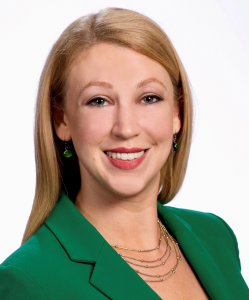
"My IC dreams started my freshman year of high school when I got to take a school trip to East Asia. I was fascinated with the region’s history and culture and knew I wanted to learn more about that part of the world. Years later when I met with a representative from Marine Corps Intelligence Activity (MCIA) during my junior year of college, I decided to apply and was lucky enough to spend a summer in Quantico working on intelligence analysis on Asia-Pacific issues...Once I graduated, I commissioned as an Intelligence Officer in the Marine Corps, and went to spend three years on mainland Japan.
After leaving active duty, I stayed in the IC as a contract employee at DIA while I completed my graduate degree...I worked as an analyst on the China team for Research, Development, and Acquisition counterintelligence, a counterespionage embedded agent for Asia-Pacific, and the lead analyst for the Acquisition Risk Task Force focused on protecting technology acquisitions as part of supply chain risk management.
After finishing grad school in 2017, I started work with the KPMG federal practice to continue to help defense and IC clients, particularly around supply chain security and predictive analytics."
"The best thing about my job is that I can be involved with different intelligence missions and organizations all within the same day. My day to day responsibilities are helping IC clients make better trust determinations when it comes to entities, people, or products, so the range of activities under that heading is pretty broad. I might be demonstrating new technology solutions to one organization around supply chain security in the morning, and reviewing requirements around personnel security or insider threat with another organization in the afternoon."
Favorite Book: Billion Dollar Whale by Bradley Hope and Tom Wright
Tyler Spyrison
INSA Intern (2019-2020)
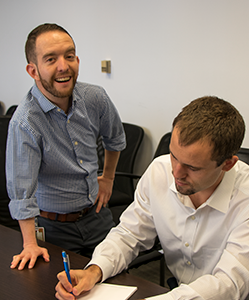
"I have always been interested in how countries interact on the international stage, but it wasn’t until after 9/11 that I really begin to become interested in the IC and how the world works when it comes to national interests and threats."
"My favorite INSA event was the Baker Awards. I thought Keith Alexander was a very humble, fascinating speaker. Everyone was dressed up for the Black-Tie event and I saw some individuals that I have read about, such as James Clapper."
"I see facial recognition as a top IC issue in 2020 as more countries develop this technology and the continuing discussions on how this type of technology works within democracies and their legal systems."
"The IC is at the forefront of using new technologies, while still having that human element. Furthermore, I really enjoy the IC‘s non-partisan, mission driven goal. Everyone I have met seems to care deeply about the mission and their colleagues and that is great to hear."
Favorite IC Movie: Patriot Games
Megan Anderson
INSA Intern (2019-2020)
Deloitte
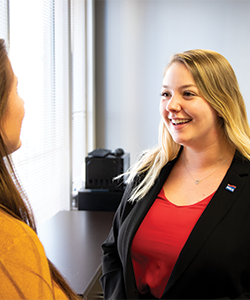
"I honestly don’t think there was a ‘moment’ that I realized I wanted a career in the intelligence community. I have known for a long time that I wanted to serve my country, but I wasn’t exactly sure where I fit. Ultimately, I think my drive to serve has pushed me towards a career in the IC."
"My favorite INSA event was the Baker Awards. It was a wonderful opportunity to meet new people, get dressed up and honor a distinguished member of the intelligence community. The fun environment coupled with the sheer amount of knowledge and experience in the room was awe-inspiring."
"Countries like Russia, China, Iran and other malicious actors may be looking to interfere with the upcoming election. I believe that the use of AI bots on social media to spread misinformation and propaganda to influence the 2020 election may be of top concern for the IC."
"The opportunity in the IC excites me! I think, as a young professional aspiring to work in the IC, I am constantly overwhelmed by the variety of positions available, the developing landscape and the broad range of issues covered. The thing that excites me the most is the constantly changing environment that provides no opportunity for stagnancy in my future career."
Favorite IC Movie: Zero Dark Thirty
Favorite IC Podcast: Intelligence Matters
